
Primary goal of attending an international conference is to present a paper to the experts and influencers. It gives you a platform to exchange your interest-related thoughts, paving the way for possible future collaborations.

Use this platform to build connections with an elite group of wise men and women to enhance your intellect. Young entrepreneurs, this is a great platform to connect with your peers.

Knowledge is Power. Knowledge teaches skills. Skills define excellence. Use this platform to become cognizant of your interest area to achieve excellence in your domain.

Attending a conference give you opportunity to get your abstract or paper published in conference proceedings

Meet and greet a myriad of industry professionals and academia experts with common interest. Every meal will be an opportunity to meet and interact with fellow researchers, attendees and experts.

Expand your professional competency and learn useful tips and tricks of your industry in our skill-building workshops.

Explore insights on recent advancements, new equipment, new techniques, and unpublished data, learn from thought-leaders and get to network with a great line up of speakers.

Our exhibits floor offers the attendees with a dynamic display of the latest products with cutting-edge technology.

Investing in you is the best investment. Peers Alley conferences give the patrons with a feeling of the serendipity of real learning, skill development in strategic workshops, networking and start-up opportunities, thus, is value for money.

Attending the conference gives you much needed break from your regular duties. It also allows you to explore new cities, culture and meet new people. You will feel energized and rejuvenated to return to the university and continue with the job after attending the conference.
Conferences are vital forum for academic researchers and business leaders. "It involves multiple presentations, interactive breakout sessions, hands-on product demonstrations and unrivalled networking opportunities".
We have invited some of the world's most sought-after keynote speakers, experts, brand ambassadors, and industry leaders to share their thoughts and ideas with our conference guests.
Register Now
Addiction Medicine Market: Market Size in 2021: US$ 8,297.0 Mn | 2028 Value Projection: US$ 12,210.0 Mn
Adv. AMMH 2024 congress would offer platform for psychiatrists, addiction therapists, psychologists, behavioral health therapists, physicians, and other healthcare practitioners to showcase and debate on these latest evidence-based practices, treatment methods, and cutting-edge research in addiction medicine, psychiatry and mental health.
Global Mental Health Market:
The Mental Health Market was valued at USD 386.10 billion in 2021 and is expected to increase at a CAGR of 3.5% from USD 399.61 billion in 2022 to USD 526.21 billion by 2030.
The global Mental Health market includes products and services used to prevent, treat, and manage mental health issues. The goal of the mental health market is to provide effective and accessible treatment alternatives for people suffering from mental health illnesses.
Dear Esteemed Participants and Distinguished Colleagues,
We are delighted to welcome you to the Global Congress on Advances in Addiction Medicine and Mental Health, which will take place in Amsterdam, Netherlands, on June 25 and 26, 2024. This conference will focus on the critically important topics of behavioural health, psychiatry, and addiction medicine.
Every year, the global rate of addiction rises at an alarming rate. The need for ongoing research and evidence-based practises to aid in the treatment, recovery, and quality of life of persons suffering from addiction is critical. This conference will provide a rich learning environment with the purpose of improving skill sets and exchanging cutting-edge scientific information regarding the intricate interactions between brain circuits, heredity, environment, and the individual's life experiences. It also provides psychotropic medications, high-quality science-based education and networking opportunities.
In addition, the future of psychiatry looks to be headed in the direction of personalization, which will be made possible by contemporary technology that can analyse the DNA of individuals and customise treatment plans to specific mental conditions. This will hopefully lead to easier and more widespread diagnosis. Notably, the focus of our event will also be on important research pertaining to the use of computer-based therapies for mental health conditions.
The conference features keynote forums, plenary sessions, distinguished speaker talks, posters, young investigator sessions, and a panel discussion with elite speakers and experts, representing various disciplines in this line of research.
We hope that this scientific program covers a wide range of topics and it will live up to your expectations.
We hope you will join us at this incredible event, and we hope to see you soon at the Adv. AMMH 2024.
With best regards,
Adv. AMMH 2024
Organizing Committee
Peers Alley Media, Canada

The Ohio State University, USA

IIstanbul 29 Mayıs University, Turkey

Nanjing University of Posts and Telecommunications, China

University of Applied Sciences Düsseldorf, Germany
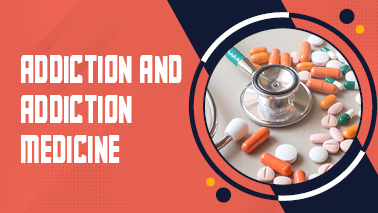
Addiction is a complex and chronic disease characterized by drug seeking and use that is compulsive, or difficult to control, despite harmful consequences. It can result from various factors, including genetic predisposition, environmental influences, and psychological factors. Addiction can involve substances like alcohol, drugs (both prescription and illicit), as well as behaviors such as gambling, internet use, and even certain foods.
Addiction Medicine is a specialized field of medicine that focuses on the prevention, evaluation, diagnosis, treatment, and recovery from addiction. Here are some key aspects of addiction and addiction medicine:
Understanding Addiction: Addiction involves changes in the brain's reward and motivation centers, leading to a powerful craving for the substance or behavior. It can lead to physical and psychological dependence, withdrawal symptoms, and a cycle of compulsive use.
Substance Use Disorders (SUDs): Addiction medicine commonly deals with substance use disorders (SUDs), which involve the misuse of substances like alcohol, opioids, cocaine, and other drugs. These disorders have a range of severity, from mild to severe.
Behavioral Addictions: In addition to substance use disorders, addiction medicine may also address behavioral addictions, such as gambling addiction or internet addiction. These involve compulsive behaviors that can have negative consequences on a person's life.
Treatment Modalities: Addiction medicine employs various treatment modalities, including medication-assisted treatment (MAT), counseling, psychotherapy, and support groups like Alcoholics Anonymous (AA) or Narcotics Anonymous (NA).
Assessment and Diagnosis: Addiction medicine specialists assess and diagnose addiction and its severity. They may use screening tools, interviews, and medical history to make an accurate diagnosis.
Withdrawal Management: In cases of substance addiction, addiction medicine professionals manage the withdrawal process, which can be uncomfortable and even life-threatening in some cases. Medications may be used to ease withdrawal symptoms.
Long-Term Recovery: Addiction medicine emphasizes long-term recovery and relapse prevention. Treatment plans are often tailored to the individual's needs, and ongoing support is provided to help maintain sobriety.
Dual Diagnosis: Many individuals with addiction also have co-occurring mental health disorders, known as dual diagnosis or co-occurring disorders. Addiction medicine specialists are trained to address both addiction and underlying mental health conditions.
Prevention: Addiction medicine plays a role in prevention efforts by educating individuals and communities about the risks associated with substance use and promoting healthier behaviors.
Research and Advancements: The field of addiction medicine continually evolves as researchers study the neurobiology of addiction, develop new medications, and refine treatment approaches.
Stigma Reduction: Addiction medicine also works to reduce the stigma associated with addiction, recognizing it as a medical condition rather than a moral failing.
Collaborative Care: Addiction medicine often involves a multidisciplinary approach, with healthcare professionals, therapists, social workers, and support networks working together to provide comprehensive care.
Tags
Addiction Therapy Conferences 2023 China
Addiction Research Conferences 2023 Asia
Addiction Conferences 2023
Addiction Research Conferences 2023 USA
Addiction Psychiatry Conferences
Clinical Psychiatry Conferences
Addiction Treatment Conferences
Mental Health Confereces 2023
Addiction Research Conferences 2023 Europe
Addiction Conferences
Addictive Disorders Conferences
Behavioural Addiction Conferences 2023
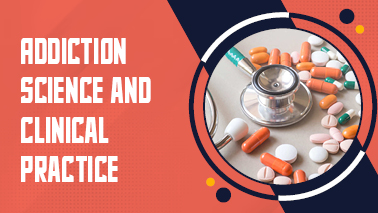
Addiction Science and Clinical Practice (ASCP) is a peer-reviewed, open-access journal that focuses on research and clinical practice in the field of addiction medicine. It aims to bridge the gap between addiction science and clinical care, providing a platform for the dissemination of evidence-based research and clinical experiences related to addiction treatment and recovery.
Here are some key aspects of Addiction Science and Clinical Practice:
Research and Evidence-Based Practices: ASCP publishes original research articles, reviews, case reports, and other scholarly contributions that explore various aspects of addiction, including the neurobiology of addiction, treatment interventions, prevention strategies, and outcomes research. The journal emphasizes the importance of evidence-based practices in addiction treatment.
Interdisciplinary Approach: Given the complex nature of addiction, ASCP encourages contributions from a wide range of disciplines, including medicine, psychology, psychiatry, social work, nursing, and public health. This interdisciplinary approach helps provide a comprehensive understanding of addiction and its treatment.
Clinical Guidelines: ASCP often features articles and reviews related to clinical guidelines and best practices for addiction treatment. This information is valuable for healthcare professionals and addiction medicine specialists in their clinical decision-making processes.
Treatment Modalities: The journal covers various treatment modalities used in addiction medicine, including medication-assisted treatment (MAT), behavioral therapies, counseling techniques, and harm reduction strategies. It also explores the latest advancements in addiction pharmacotherapy.
Co-Occurring Disorders: Co-occurring mental health disorders are common among individuals with addiction. ASCP addresses the assessment and treatment of co-occurring disorders (dual diagnosis) to provide holistic care.
Recovery Support: Articles in ASCP often discuss strategies for long-term recovery and relapse prevention. These topics are crucial for healthcare providers and individuals in recovery.
Policy and Public Health: The journal occasionally covers topics related to addiction policy, public health initiatives, and harm reduction strategies. It provides a platform for discussing the broader societal aspects of addiction.
Education and Training: ASCP may feature articles related to education and training in addiction medicine. This is essential for the professional development of addiction medicine specialists.
Patient-Centered Care: The journal emphasizes patient-centered care and the importance of tailoring addiction treatment to individual needs and preferences.
Global Perspective: ASCP may also include research and clinical experiences from different parts of the world, offering a global perspective on addiction science and clinical practice.
Stigma Reduction: Like addiction medicine, ASCP is committed to reducing the stigma associated with addiction and highlighting the importance of treating addiction as a medical condition.
Tags
Addiction Psychiatry Conferences
Mental Health Confereces 2023
Addiction Research Conferences 2023 Asia
Addictive Disorders Conferences
Addiction Treatment Conferences
Addiction Therapy Conferences 2023 Middle East
Addiction Conferences 2023
Behavioural Addiction Conferences 2023
Clinical Psychiatry Conferences
Addiction Conferences
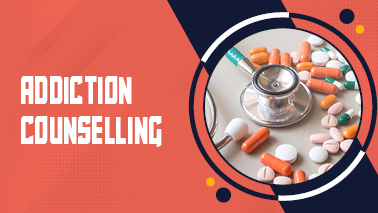
Addiction counseling, often referred to as substance abuse counseling or substance use disorder counseling, is a specialized form of counseling or therapy that focuses on helping individuals who are struggling with addiction to drugs, alcohol, or other substances. The primary goal of addiction counseling is to support individuals in achieving and maintaining abstinence from substance use and to address the underlying psychological, emotional, and behavioral factors that contribute to addiction.
Here are some key aspects of addiction counseling:
Assessment: The first step in addiction counseling is to conduct a thorough assessment of the individual's substance use and related issues. This assessment helps the counselor understand the extent of the addiction, any co-occurring mental health disorders, and the individual's unique treatment needs.
Treatment Planning: Based on the assessment, the counselor works with the client to develop a personalized treatment plan. This plan outlines specific goals, interventions, and strategies for addressing the addiction and its underlying causes.
Individual and Group Counseling: Addiction counselors provide both individual and group counseling sessions. Individual counseling allows for one-on-one discussions, while group counseling provides a supportive environment for individuals to share their experiences and learn from others facing similar challenges.
Psychoeducation: Addiction counselors educate clients about the nature of addiction, the effects of substances on the body and mind, and the principles of recovery. This education helps clients make informed decisions about their recovery.
Cognitive-Behavioral Therapy (CBT): CBT is a commonly used therapeutic approach in addiction counseling. It helps individuals identify and change unhealthy thought patterns and behaviors associated with addiction. CBT also teaches coping skills to manage cravings and triggers.
Motivational Enhancement Therapy (MET): MET is a client-centered approach that aims to enhance an individual's motivation to change their substance use behavior. It helps clients explore their own reasons for change and set achievable goals.
Family Counseling: Addiction often affects not only the individual but also their family members. Family counseling can help improve communication, address codependency issues, and involve loved ones in the recovery process.
Relapse Prevention: Addiction counselors teach clients strategies to recognize and cope with triggers and cravings to prevent relapse. Developing a relapse prevention plan is a crucial component of addiction counseling.
Support and Accountability: Counselors provide support and accountability to clients throughout their recovery journey. They may also connect clients with support groups like Alcoholics Anonymous (AA) or Narcotics Anonymous (NA).
Holistic Approach: Effective addiction counseling often takes a holistic approach, addressing not only the addiction but also the individual's overall well-being, including physical, emotional, and social aspects.
Continuing Care: Addiction counseling doesn't end with initial treatment. Counselors help clients plan for ongoing care and support to maintain sobriety and address any relapses.
Ethical Considerations: Addiction counselors adhere to ethical guidelines that prioritize client confidentiality, respect, and nonjudgmental support.
Tags
Mental Health Confereces 2023
Clinical Psychiatry Conferences
Drug Abuse Conferences
Addiction Therapy Conferences 2023 Middle East
Addiction Conferences 2023
Addiction Research Conferences 2023 USA
Cognitive Disorders Conferences
Addiction Research Conferences 2023 Asia
Addiction Therapy Conferences 2023 China
Addiction Treatment Conferences
Addiction Therapy Conferences
Addiction Psychiatry Conferences
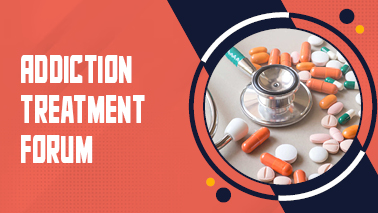
The Addiction Treatment Forum is a resource and community platform that focuses on the field of addiction treatment and recovery. It serves as a valuable source of information, news, research, and discussions related to addiction treatment and related topics.
Here are some key aspects and features of the Addiction Treatment Forum:
Information Hub: The forum serves as an information hub for healthcare professionals, researchers, policymakers, and anyone interested in addiction treatment. It provides access to the latest developments, research findings, and best practices in the field.
News and Updates: Addiction Treatment Forum offers news articles, updates, and reports related to addiction treatment, medications, therapies, policy changes, and emerging trends. These resources help keep the community informed about current events and developments in the field.
Evidence-Based Practices: The forum emphasizes evidence-based practices in addiction treatment. It promotes the use of scientifically validated approaches to address substance use disorders.
Medication-Assisted Treatment (MAT): Given the importance of MAT in addiction treatment, the forum often covers topics related to medications used in the treatment of opioid addiction and other substance use disorders. This includes information on medications like methadone, buprenorphine, and naltrexone.
Peer Support and Networking: Addiction Treatment Forum provides a platform for professionals and individuals involved in addiction treatment to connect, share experiences, and exchange ideas. It fosters a sense of community and collaboration.
Research and Publications: The forum may feature research articles, publications, and resources related to addiction treatment and recovery. It helps disseminate valuable information to a wider audience.
Treatment Modalities: Discussions on various treatment modalities, including behavioral therapies, counseling approaches, and harm reduction strategies, are common on the forum. It allows members to learn about different approaches to addiction treatment.
Policy and Advocacy: The forum may engage in discussions about addiction-related policies, advocacy efforts, and the impact of legislation on addiction treatment services.
Recovery Support: Supporting long-term recovery is a key focus of the forum. It provides insights into strategies for maintaining sobriety, relapse prevention, and the importance of ongoing care.
Holistic Approach: The forum recognizes the importance of a holistic approach to addiction treatment, addressing not only the physical aspects of addiction but also the emotional, psychological, and social dimensions.
Stigma Reduction: Like many organizations in the field of addiction treatment, the forum works to reduce the stigma associated with addiction and encourages compassionate, nonjudgmental care.
Education and Training: Addiction Treatment Forum may offer resources related to education and training opportunities in addiction medicine and counseling.
Tags
Addiction Therapy Conferences 2023 China
Addiction Research Conferences 2023 Asia
Behavioural Addiction Conferences 2023
Drug Abuse Conferences
Addiction Research Conferences 2023 Europe
Addiction Treatment Conferences
Addiction Medicine Conferences
Addiction Conferences 2023
Addiction Conferences
Addiction Research Conferences 2023 USA
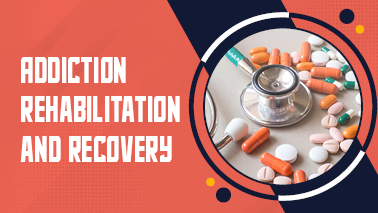
Addiction rehabilitation and recovery encompass a range of programs, services, and strategies aimed at helping individuals with substance use disorders overcome their addiction, regain control of their lives, and achieve and maintain long-term sobriety. It's a multi-faceted and often lifelong process that involves physical, psychological, and social aspects.
Here are key components and concepts related to addiction rehabilitation and recovery:
Assessment and Evaluation: The process typically begins with a comprehensive assessment by healthcare professionals to determine the severity of the addiction and any co-occurring mental health disorders. This assessment helps tailor the treatment plan to the individual's needs.
Detoxification (Detox): In cases of physical dependence, individuals may need medical detoxification to safely manage withdrawal symptoms. Detox is often the first step in addiction rehabilitation.
Inpatient or Outpatient Treatment: Depending on the severity of the addiction and individual circumstances, individuals may enter inpatient (residential) or outpatient treatment programs. Inpatient programs provide 24/7 support and structure, while outpatient programs offer flexibility and allow participants to continue with daily life.
Medication-Assisted Treatment (MAT): MAT involves the use of medications, such as methadone, buprenorphine, or naltrexone, in combination with counseling and therapy. It's effective for opioid and alcohol use disorders.
Behavioral Therapy: Various forms of therapy, including cognitive-behavioral therapy (CBT), contingency management, motivational enhancement therapy (MET), and dialectical behavior therapy (DBT), are commonly used in addiction treatment. They help individuals identify and change addictive behaviors and thought patterns.
Group Therapy: Group therapy sessions allow individuals to share their experiences, receive peer support, and learn from others in recovery. It fosters a sense of community and reduces isolation.
Individual Counseling: One-on-one counseling sessions with trained therapists or addiction counselors provide a personalized approach to address underlying issues and develop coping strategies.
Holistic Approaches: Many addiction rehabilitation programs adopt a holistic approach, considering the physical, emotional, mental, and spiritual dimensions of recovery. This may include activities like yoga, meditation, and mindfulness.
Relapse Prevention: Learning to recognize triggers and developing effective coping strategies to prevent relapse is a central component of addiction recovery.
Support Groups: Organizations like Alcoholics Anonymous (AA) and Narcotics Anonymous (NA) offer ongoing support and a structured 12-step program to help individuals maintain sobriety.
Family Involvement: Addiction often affects family members, so involving loved ones in therapy and education can improve family dynamics and provide a support system for the individual in recovery.
Continuing Care and Aftercare: Recovery doesn't end with treatment. Aftercare and ongoing support are crucial for maintaining sobriety. This may involve regular therapy, support group attendance, or transitional housing.
Lifestyle Changes: Individuals in recovery often need to make significant lifestyle changes, such as avoiding triggers, finding new social circles, and adopting healthier habits.
Dual Diagnosis: Treating co-occurring mental health disorders (dual diagnosis) is essential for long-term recovery. Integrated care addresses both addiction and mental health issues simultaneously.
Long-Term Recovery Plans: Individuals in recovery develop personalized, long-term recovery plans to sustain sobriety and address any challenges that arise.
Stigma Reduction: Reducing the stigma associated with addiction is crucial for individuals seeking help and receiving the support they need.
Tags
Addiction Therapy Conferences 2023 China
Cognitive Disorders Conferences
Addictive Disorders Conferences
Addiction Conferences 2023
Addiction Conferences
Addiction Therapy Conferences
Addiction Research Conferences 2023 Europe
Addiction Therapy Conferences 2023 Middle East
Addiction Research Conferences 2023 USA
Addiction Research Conferences 2023 Asia
Addiction Treatment Conferences
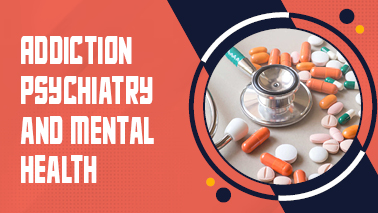
Addiction psychiatry is a specialized field within psychiatry that focuses on the evaluation, diagnosis, treatment, and prevention of substance use disorders (SUDs) and co-occurring mental health disorders. It addresses the complex interplay between addiction and mental health, recognizing that these conditions often coexist and can significantly impact an individual's well-being.
Here are some key aspects of addiction psychiatry and its relationship with mental health:
Assessment and Diagnosis: Addiction psychiatrists are trained to assess and diagnose substance use disorders and co-occurring mental health conditions. A comprehensive evaluation helps identify the specific substances involved, the severity of addiction, and any underlying psychiatric disorders.
Co-Occurring Disorders (Dual Diagnosis): Many individuals with substance use disorders also have co-occurring mental health disorders, such as depression, anxiety, bipolar disorder, or post-traumatic stress disorder (PTSD). Addiction psychiatrists are skilled in recognizing and treating both conditions simultaneously, which is essential for effective care.
Pharmacotherapy: Medications can play a crucial role in addiction treatment, especially for opioid use disorder, alcohol use disorder, and other substance dependencies. Addiction psychiatrists are knowledgeable about medications like buprenorphine, methadone, naltrexone, and acamprosate, which can help reduce cravings and withdrawal symptoms.
Psychotherapy: Addiction psychiatrists may provide psychotherapy, including cognitive-behavioral therapy (CBT), contingency management, motivational enhancement therapy (MET), and dialectical behavior therapy (DBT), to address the psychological aspects of addiction and co-occurring mental health conditions.
Treatment Planning: Based on a thorough assessment, addiction psychiatrists develop personalized treatment plans that consider the unique needs and preferences of the individual. These plans often incorporate a combination of pharmacotherapy and psychotherapy.
Integrated Care: Integrated care models involve collaboration between addiction psychiatrists, psychologists, social workers, and other mental health professionals to provide holistic and coordinated care for individuals with dual diagnoses.
Relapse Prevention: Addiction psychiatrists help individuals develop strategies for relapse prevention, including identifying triggers and high-risk situations, and building coping skills to maintain sobriety.
Education and Counseling: They educate individuals and their families about addiction, mental health, and treatment options, promoting understanding and active participation in the recovery process.
Medication Management: For individuals with co-occurring disorders, addiction psychiatrists manage medications for both conditions, ensuring that treatment plans are optimized to address both addiction and mental health symptoms.
Continuing Care: Addiction psychiatrists play a role in developing long-term recovery plans and ensuring ongoing support and monitoring to prevent relapse.
Research and Advancements: The field of addiction psychiatry is informed by ongoing research into the neurobiology of addiction, new treatment modalities, and emerging medications.
Stigma Reduction: Like other mental health professionals, addiction psychiatrists work to reduce the stigma associated with addiction and mental health disorders, advocating for compassionate, nonjudgmental care.
Tags
Cognitive Disorders Conferences
Mental Health Confereces 2023
Clinical Psychiatry Conferences
Drug Abuse Conferences
Addiction Psychiatry Conferences
Addiction Therapy Conferences
Addictive Disorders Conferences
Addiction Research Conferences 2023 Asia
Addiction Medicine Conferences
Addiction Research Conferences 2023 Europe
Addiction Treatment Conferences
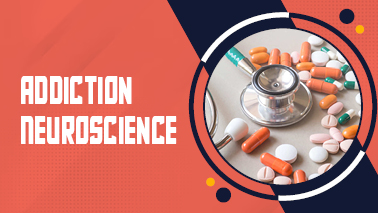
Addiction neuroscience is a branch of neuroscience that focuses on understanding the biological and neural mechanisms underlying addiction. It seeks to unravel the complex interactions between the brain, behavior, and substances (such as drugs or alcohol) that lead to addictive behaviors. This field of research plays a crucial role in advancing our understanding of addiction and informing the development of effective prevention and treatment strategies.
Here are key aspects and concepts related to addiction neuroscience:
Neurobiology of Addiction: Addiction neuroscience explores the changes that occur in the brain as a result of repeated substance use. This includes alterations in brain structure, function, and neurotransmitter systems.
Reward Pathway: A central concept in addiction neuroscience is the brain's reward pathway. This pathway involves the release of dopamine, a neurotransmitter associated with pleasure and reward, in response to rewarding stimuli, including substances like drugs. Repeated drug use can hijack this pathway, leading to the development of addiction.
Neurotransmitters: Researchers in addiction neuroscience study the role of neurotransmitters such as dopamine, serotonin, and glutamate in addiction. Dysregulation of these neurotransmitter systems is often implicated in addictive behaviors.
Neuroplasticity: The brain's ability to adapt and change in response to experience is known as neuroplasticity. Addiction neuroscience investigates how repeated substance use can lead to long-lasting changes in brain structure and function, which can perpetuate addiction.
Tolerance and Withdrawal: Tolerance (the need for increasing amounts of a substance to achieve the same effect) and withdrawal (unpleasant symptoms when substance use is discontinued) are phenomena studied in addiction neuroscience. These processes are linked to changes in neural circuitry.
Craving and Cue Reactivity: Research in this field examines how exposure to drug-related cues or triggers can lead to cravings and relapse. Understanding the neural basis of cue reactivity is important for preventing relapse in addiction treatment.
Genetics and Epigenetics: Addiction neuroscience explores the genetic and epigenetic factors that contribute to an individual's susceptibility to addiction. Genetic variations can influence an individual's response to substances and their risk of addiction.
Neuroimaging: Advanced neuroimaging techniques, such as functional magnetic resonance imaging (fMRI) and positron emission tomography (PET), allow researchers to visualize brain activity and changes associated with addiction.
Animal Models: Animal studies, particularly in rodents, are often used in addiction neuroscience to investigate the neural mechanisms of addiction. These studies can help identify potential targets for treatment.
Medications Development: Findings from addiction neuroscience research inform the development of medications for addiction treatment. Medications like methadone, buprenorphine, and naltrexone target specific neural pathways involved in addiction.
Behavioral Interventions: The integration of neuroscience findings into behavioral interventions helps in designing more effective therapeutic approaches, such as cognitive-behavioral therapies that target specific neural circuits.
Translational Research: Translational research in addiction neuroscience aims to bridge the gap between basic science discoveries and clinical applications, facilitating the development of evidence-based treatments.
Tags
Addiction Treatment Conferences
Addiction Research Conferences 2023 USA
Addiction Conferences 2023
Addiction Conferences
Cognitive Disorders Conferences
Addiction Research Conferences 2023 Asia
Clinical Psychiatry Conferences
Addiction Therapy Conferences
Behavioural Addiction Conferences 2023
Mental Health Confereces 2023
Addiction Therapy Conferences 2023 Middle East
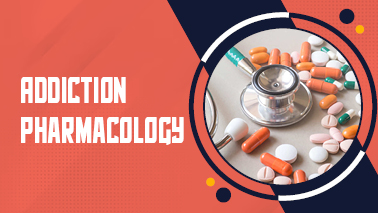
Addiction pharmacology is a branch of pharmacology that focuses on the study of drugs and medications used in the prevention, treatment, and management of substance use disorders (SUDs) and addiction. It encompasses the understanding of how various drugs, both licit and illicit, affect the brain and behavior, as well as the development of pharmacological interventions to address addiction.
Here are key aspects and concepts related to addiction pharmacology:
Substance-Specific Effects: Addiction pharmacology examines the specific effects of various substances, such as opioids, stimulants, alcohol, and sedatives, on the brain's neurochemistry and behavior. Different substances act on distinct neural pathways and receptors.
Neurotransmitters and Receptors: Researchers in this field study the interactions between drugs and neurotransmitters, including dopamine, serotonin, glutamate, and GABA. Drugs can enhance or inhibit the release and reuptake of these neurotransmitters, leading to rewarding or aversive effects.
Reward Pathway: A central focus is the brain's reward pathway, particularly the release of dopamine, which is associated with pleasure and reinforcement. Many addictive substances stimulate dopamine release, contributing to their addictive potential.
Tolerance and Withdrawal: Addiction pharmacology explores the development of tolerance (the need for increasing amounts of a drug to achieve the same effect) and withdrawal symptoms (unpleasant physical and psychological effects when drug use is discontinued). These phenomena are associated with neuroadaptive changes in the brain.
Medications for Addiction Treatment: Research in addiction pharmacology informs the development of medications for addiction treatment. These medications are often used in medication-assisted treatment (MAT) programs. Examples include methadone, buprenorphine, and naltrexone for opioid use disorder, and acamprosate and naltrexone for alcohol use disorder.
Pharmacokinetics: Understanding the pharmacokinetics of addictive substances, such as their absorption, distribution, metabolism, and elimination in the body, is essential for predicting their effects and potential for addiction.
Pharmacodynamics: This involves studying how drugs interact with specific receptors and signaling pathways in the brain to produce their effects. Understanding pharmacodynamics helps identify potential targets for medications to treat addiction.
Craving and Relapse Prevention: Addiction pharmacology investigates medications that can reduce drug cravings and prevent relapse, as these are critical challenges in addiction treatment.
Dual Diagnosis Treatment: In cases of co-occurring mental health disorders and addiction (dual diagnosis), pharmacological interventions may target both conditions simultaneously.
Harm Reduction: Some pharmacological approaches focus on harm reduction, which aims to minimize the negative consequences of drug use, even if complete abstinence is not immediately achievable. Examples include naloxone to reverse opioid overdoses and nicotine replacement therapies for smoking cessation.
Neuroadaptive Changes: Long-term drug use leads to neuroadaptive changes in the brain that perpetuate addiction. Addiction pharmacology explores strategies to reverse or mitigate these changes.
Personalized Medicine: There is growing interest in personalized medicine approaches in addiction pharmacology, tailoring treatment plans based on an individual's genetic and neurobiological profile.
Research into Novel Medications: Ongoing research seeks to identify and develop new medications for the treatment of addiction, including medications that target specific neural circuits involved in addiction.
Safety and Monitoring: Addiction pharmacology also addresses the safety and monitoring of medications used in addiction treatment, ensuring that they are effective and well-tolerated.
Tags
Addiction Therapy Conferences 2023 Middle East
Behavioural Addiction Conferences 2023
Addiction Medicine Conferences
Cognitive Disorders Conferences
Addictive Disorders Conferences
Drug Abuse Conferences
Addiction Conferences 2023
Addiction Therapy Conferences 2023 China
Addiction Therapy Conferences
Addiction Treatment Conferences
Clinical Psychiatry Conferences
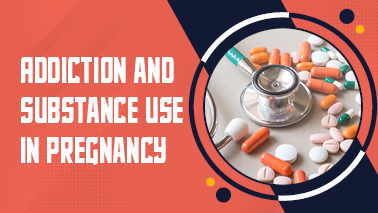
Addiction and substance use during pregnancy is a complex and concerning issue that can have serious health implications for both the pregnant person and the developing fetus. Substance use during pregnancy can lead to a range of adverse outcomes, including preterm birth, low birth weight, developmental issues, and neonatal withdrawal syndrome.
Here are key aspects to consider:
Substances of Concern: Pregnant individuals may use a variety of substances, including alcohol, tobacco, prescription medications, illicit drugs (such as marijuana, cocaine, and opioids), and even certain over-the-counter medications or herbal supplements.
Effects on Fetal Development: Substance use during pregnancy can harm the developing fetus. The effects vary depending on the substance and the timing and extent of use. For example:
Alcohol: Can lead to fetal alcohol spectrum disorders (FASD), characterized by physical, behavioral, and intellectual disabilities.
Tobacco: Increases the risk of preterm birth, low birth weight, and sudden infant death syndrome (SIDS).
Opioids: Can result in neonatal abstinence syndrome (NAS), where the baby experiences withdrawal symptoms after birth.
Cocaine: May lead to preterm birth, low birth weight, and developmental issues.
Marijuana: More research is needed, but some studies suggest it may be associated with lower birth weight.
Screening and Assessment: Healthcare providers routinely screen pregnant individuals for substance use during prenatal care visits. Honest and open communication about substance use is crucial to provide appropriate care and support.
Treatment Options: Pregnant individuals with substance use disorders often require specialized treatment. Options may include:
Medication-Assisted Treatment (MAT): For opioid use disorders, medications like methadone or buprenorphine can be prescribed under medical supervision.
Behavioral Therapies: Counseling and behavioral therapies can help address substance use and its underlying causes.
Comprehensive Care: Integrated care that addresses both substance use and prenatal care is essential. This may involve collaboration between addiction specialists, obstetricians, and mental health professionals.
Harm Reduction: In some cases, harm reduction strategies, such as needle exchange programs for individuals who inject drugs, can help reduce the risks associated with substance use during pregnancy.
Legal and Ethical Considerations: Some regions have legal requirements for reporting substance use during pregnancy, and there can be ethical dilemmas surrounding issues of autonomy, privacy, and the well-being of the fetus.
Education and Prevention: Public health efforts aim to educate individuals about the risks of substance use during pregnancy and promote prevention strategies. This includes providing information on the potential consequences of substance use and available resources for treatment and support.
Social and Psychosocial Factors: Addressing substance use during pregnancy also requires consideration of the social determinants of health, such as socioeconomic status, access to healthcare, and social support networks.
Long-Term Effects: Substance use during pregnancy can have long-term effects on the child's health and development. Early intervention and support for both the child and the parent are crucial.
Tags
Clinical Psychiatry Conferences
Behavioural Addiction Conferences 2023
Cognitive Disorders Conferences
Addiction Conferences
Addictive Disorders Conferences
Addiction Therapy Conferences 2023 Middle East
Addiction Therapy Conferences 2023 China
Addiction Research Conferences 2023 Europe
Addiction Conferences 2023
Addiction Psychiatry Conferences
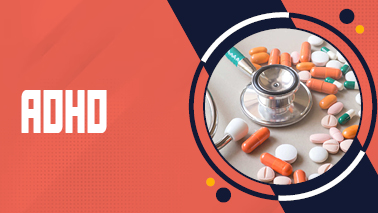
Attention-Deficit/Hyperactivity Disorder (ADHD) is a neurodevelopmental disorder that affects both children and adults. It is characterized by a persistent pattern of inattention, hyperactivity, and impulsivity that interferes with daily functioning and quality of life. ADHD is a complex and multifactorial condition, and its exact cause is not fully understood.
Here are key aspects of ADHD:
Symptoms: ADHD symptoms can be categorized into two main groups
Inattention: Individuals with ADHD may have difficulty sustaining attention, following through on tasks, and organizing activities. They may be forgetful, lose things, and make careless mistakes.
Hyperactivity and Impulsivity: People with ADHD may have difficulty sitting still, be fidgety or restless, and have trouble waiting their turn. They may interrupt others, act impulsively without thinking, and have difficulty with self-control.
Types of ADHD: ADHD can be classified into three subtypes:
Predominantly Inattentive Presentation: Characterized primarily by inattention symptoms.
Predominantly Hyperactive-Impulsive Presentation: Characterized primarily by hyperactivity and impulsivity symptoms.
Combined Presentation: Involves a combination of inattention, hyperactivity, and impulsivity symptoms.
Diagnosis: Diagnosing ADHD typically involves a comprehensive assessment that considers the individual's history, behaviors, and symptoms. Healthcare professionals often use criteria from the Diagnostic and Statistical Manual of Mental Disorders (DSM-5) for diagnosis.
Onset and Duration: Symptoms of ADHD often appear in childhood, although the diagnosis can be made in adulthood. To meet the diagnostic criteria, symptoms must be present for at least six months and interfere with daily functioning.
Co-Occurring Conditions: ADHD frequently co-occurs with other conditions, such as learning disorders, anxiety, depression, and substance use disorders.
Neurobiology: The exact cause of ADHD is not known, but it is believed to involve a combination of genetic, neurological, and environmental factors. Neuroimaging studies have shown differences in brain structure and function in individuals with ADHD, particularly in areas related to attention and impulse control.
Treatment: Treatment for ADHD typically includes a combination of behavioral interventions and, in some cases, medication. Behavioral therapies focus on developing skills for managing symptoms and improving functioning. Medications, such as stimulants (e.g., methylphenidate and amphetamine-based drugs) or non-stimulants (e.g., atomoxetine), can be effective in managing symptoms.
Lifestyle Strategies: In addition to therapy and medication, lifestyle strategies can help individuals with ADHD manage their symptoms. These may include creating a structured environment, setting routines, using calendars or reminder systems, and practicing time management techniques.
Educational Support: Children with ADHD may benefit from educational accommodations, such as extra time for tests or assignments, a quiet workspace, or additional instructional support.
Adult ADHD: ADHD often persists into adulthood, and diagnosis and treatment can be beneficial for adults experiencing symptoms that interfere with daily life, work, or relationships.
Support and Advocacy: Support groups and advocacy organizations can provide valuable resources, information, and a sense of community for individuals with ADHD and their families.
Tags
Addiction Therapy Conferences 2023 Middle East
Drug Abuse Conferences
Addictive Disorders Conferences
Addiction Treatment Conferences
Addiction Conferences
Addiction Medicine Conferences
Addiction Therapy Conferences 2023 China
Addiction Psychiatry Conferences
Clinical Psychiatry Conferences
Behavioural Addiction Conferences 2023
Addiction Research Conferences 2023 USA
Addiction Research Conferences 2023 Asia
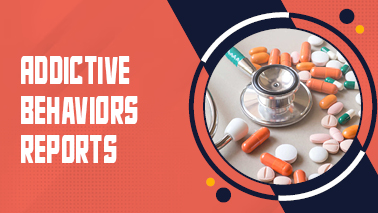
Addictive Behaviors Reports is a peer-reviewed, open-access journal that focuses on publishing research articles and reports related to addictive behaviors and substance use disorders. It serves as a platform for researchers and professionals to share their findings and insights on a wide range of topics within the field of addiction.
Here are some key aspects of Addictive Behaviors Reports:
Scope: The journal covers a broad spectrum of addictive behaviors, including but not limited to substance use disorders (e.g., alcohol, drugs, tobacco), gambling addiction, internet and gaming addiction, and other behavioral addictions.
Research Articles: Addictive Behaviors Reports publishes original research articles that present empirical findings, data analyses, and research methodologies related to addictive behaviors. These articles contribute to the scientific understanding of addiction and its various aspects.
Short Reports: In addition to full research articles, the journal also accepts short reports that provide concise and focused findings on specific aspects of addictive behaviors. Short reports are a valuable format for sharing timely research results.
Open Access: The journal follows an open-access model, which means that all articles are freely accessible to readers. This open-access format promotes the dissemination of knowledge and allows a wider audience to benefit from the research.
Peer Review: Articles submitted to Addictive Behaviors Reports undergo a peer-review process, ensuring the quality and validity of the research published in the journal. Expert reviewers evaluate the scientific rigor of each submission.
Interdisciplinary Approach: The journal encourages contributions from various disciplines, including psychology, psychiatry, public health, social work, neuroscience, and more. This interdisciplinary approach allows for a comprehensive understanding of addictive behaviors.
Prevention and Treatment: Research on prevention strategies and treatment interventions for addictive behaviors is a significant focus of the journal. Articles may explore the effectiveness of interventions, clinical outcomes, and innovative treatment approaches.
Epidemiology and Public Health: Addictive Behaviors Reports may feature research on the prevalence of addictive behaviors, risk factors, and public health implications. This information is valuable for policymakers and public health practitioners.
Behavioral Mechanisms: The journal may include studies that investigate the underlying behavioral and cognitive mechanisms involved in addictive behaviors. This research helps elucidate the processes that contribute to addiction.
Comorbidity and Co-Occurring Disorders: Articles may address the relationship between addictive behaviors and co-occurring mental health disorders, providing insights into the complexity of addiction.
Emerging Trends: Addictive Behaviors Reports may cover emerging trends in addictive behaviors, such as the impact of new technologies on addiction or changing patterns of substance use.
Stigma Reduction and Harm Reduction: The journal may publish research that focuses on reducing the stigma associated with addiction and explores harm reduction strategies.
Tags
Mental Health Confereces 2023
Addiction Psychiatry Conferences
Drug Abuse Conferences
Cognitive Disorders Conferences
Addiction Research Conferences 2023 Asia
Addiction Conferences
Addiction Research Conferences 2023 Europe
Addiction Treatment Conferences
Behavioural Addiction Conferences 2023
Addiction Research Conferences 2023 USA
Addiction Conferences 2023
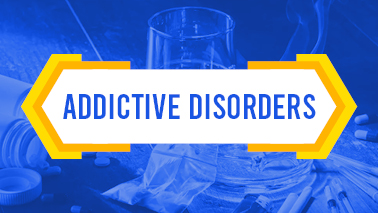
Addictive disorders, also known as substance use disorders (SUDs), are a group of chronic conditions characterized by the repeated use of substances such as drugs or alcohol despite negative consequences. These disorders are complex and can have serious physical, psychological, and social implications.
Here are key aspects of addictive disorders:
Substances of Abuse: Addictive disorders can involve various substances, including.
Alcohol: Alcohol use disorder (AUD) is characterized by excessive and compulsive alcohol consumption, leading to physical and psychological dependence.
Illicit Drugs: This category includes substances like cocaine, heroin, methamphetamine, and hallucinogens. Each drug can lead to its own specific use disorder.
Prescription Medications: The misuse of prescription drugs, such as opioids, sedatives, and stimulants, can result in substance use disorders.
Tobacco: Nicotine addiction, primarily from cigarette smoking, is another common addictive disorder.
Cannabis: Cannabis use disorder can occur when individuals have difficulty controlling their use of marijuana.
Other Substances: Various other substances, including synthetic drugs, inhalants, and designer drugs, can lead to addictive disorders.
Diagnostic Criteria: Addictive disorders are diagnosed based on criteria outlined in the Diagnostic and Statistical Manual of Mental Disorders (DSM-5). Common criteria include craving, tolerance, withdrawal, and unsuccessful attempts to quit or cut down.
Physical and Psychological Dependence: Addictive disorders often involve both physical and psychological dependence. Physical dependence leads to withdrawal symptoms when the substance is discontinued, while psychological dependence involves a strong emotional need to use the substance.
Behavioral Symptoms: Individuals with addictive disorders may exhibit behaviors such as neglecting responsibilities, spending a significant amount of time obtaining or using the substance, and giving up important activities due to substance use.
Impact on Health: Addictive disorders can have severe health consequences, including organ damage, infectious diseases (e.g., HIV/AIDS from sharing needles), overdose, and mental health issues.
Co-Occurring Disorders: Many individuals with addictive disorders also have co-occurring mental health disorders, such as depression, anxiety, or post-traumatic stress disorder (PTSD). These conditions often complicate treatment.
Treatment: Treatment for addictive disorders can include a combination of behavioral therapies (e.g., cognitive-behavioral therapy), medication-assisted treatment (e.g., methadone for opioid use disorder), support groups (e.g., Alcoholics Anonymous), and counseling. The choice of treatment depends on the specific substance and individual needs.
Recovery and Relapse: Recovery from addictive disorders is possible, but it is often a lifelong process. Relapse can occur, and it is considered a common part of the recovery journey. The goal is to learn from relapses and continue working towards sobriety.
Stigma Reduction: Reducing the stigma associated with addictive disorders is essential to encourage individuals to seek help and to promote understanding and compassion.
Prevention: Prevention efforts aim to educate individuals about the risks of substance abuse and to implement strategies to reduce the initiation of substance use, especially among youth.
Harm Reduction: Harm reduction strategies focus on minimizing the negative consequences of substance use, even if complete abstinence is not immediately achievable. Examples include needle exchange programs and supervised injection facilities.
Public Health Impact: Addictive disorders have a significant public health impact due to their widespread prevalence and associated health and social costs. Public health initiatives aim to address these issues on a larger scale.
Tags
Mental Health Confereces 2023
Addiction Psychiatry Conferences
Addiction Research Conferences 2023 Asia
Clinical Psychiatry Conferences
Addiction Conferences
Behavioural Addiction Conferences 2023
Drug Abuse Conferences
Addiction Research Conferences 2023 Europe
Addiction Conferences 2023
Addictive Disorders Conferences
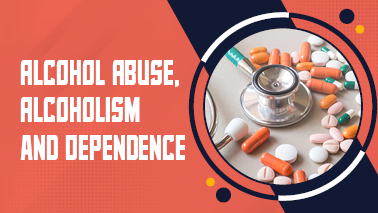
Alcohol abuse, alcoholism, and alcohol dependence are related but distinct terms used to describe problematic patterns of alcohol consumption. These terms have been used in various ways in the past, but the Diagnostic and Statistical Manual of Mental Disorders, Fifth Edition (DSM-5) has introduced a more unified classification system for these issues.
Here's a breakdown of these terms:
Alcohol Abuse:
Definition: Alcohol abuse refers to a pattern of alcohol use in which an individual repeatedly experiences harmful consequences as a result of their drinking.
Characteristics:
Individuals who abuse alcohol may engage in risky behaviors such as drinking and driving, neglecting responsibilities, or getting into trouble with the law.
They may have relationship problems, difficulties at work or school, and a general disregard for the negative consequences of their drinking.
Despite these problems, individuals who abuse alcohol do not meet the criteria for alcohol dependence (alcoholism) according to the DSM-5.
Alcohol Dependence (Alcoholism):
Definition: Alcohol dependence, often referred to as alcoholism, is a severe and chronic form of alcohol use disorder characterized by physiological and psychological dependence on alcohol.
Characteristics:
Individuals with alcohol dependence experience a strong compulsion to drink, often unable to control their alcohol consumption.
They develop tolerance, meaning they need more alcohol to achieve the desired effect, and they experience withdrawal symptoms when they try to stop drinking.
Alcoholism can lead to a preoccupation with obtaining and consuming alcohol, often at the expense of other important aspects of life, including relationships, work, and health.
It's important to note that the DSM-5 has introduced a single diagnostic category for these issues, known as Alcohol Use Disorder (AUD). AUD encompasses a spectrum of problematic alcohol use, ranging from mild to severe, and includes symptoms of both alcohol abuse and alcohol dependence. Clinicians diagnose AUD based on the number of criteria a person meets, with mild, moderate, or severe levels of AUD. This new classification system is designed to provide a more comprehensive and flexible approach to diagnosing alcohol-related problems.
Tags
Addiction Therapy Conferences 2023 China
Addiction Medicine Conferences
Mental Health Confereces 2023
Addiction Research Conferences 2023 Asia
Addiction Conferences 2023
Behavioural Addiction Conferences 2023
Addiction Therapy Conferences 2023 Middle East
Addiction Research Conferences 2023 USA
Addictive Disorders Conferences
Clinical Psychiatry Conferences
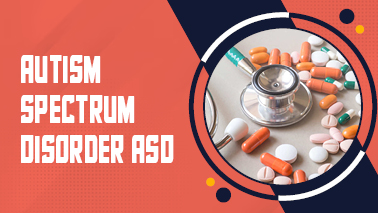
Autism Spectrum Disorder (ASD) is a complex neurodevelopmental disorder characterized by a wide range of symptoms and challenges related to social communication, repetitive behaviors, and restricted interests. ASD is often referred to as a "spectrum" because it encompasses a broad range of presentations, from mild to severe, and individuals with ASD can have varying strengths and difficulties.
Here are key aspects of Autism Spectrum Disorder:
Core Symptoms:
Social Communication Challenges: Individuals with ASD often have difficulty with social interactions and communication. This may include difficulty with making eye contact, understanding and using nonverbal cues (like gestures and facial expressions), and engaging in back-and-forth conversations.
Repetitive Behaviors: Many individuals with ASD engage in repetitive and stereotyped behaviors or interests. These can include repetitive hand-flapping, rocking, lining up objects, or having highly focused and narrow interests.
Sensory Sensitivities: People with ASD may be hypersensitive or hyposensitive to sensory stimuli, such as lights, sounds, textures, and tastes. These sensory sensitivities can be distressing and may affect daily functioning.
Communication Challenges: Some individuals with ASD may have delayed or limited speech and language development, while others may have advanced language skills but struggle with pragmatic language (the use of language in social contexts).
Diagnosis: Diagnosis of ASD is typically made through comprehensive evaluations conducted by healthcare professionals, psychologists, or developmental specialists. The evaluation may include assessments of communication, social interaction, behavior, and developmental history.
Early Intervention: Early intervention is critical for children with ASD. Behavioral therapies, speech therapy, occupational therapy, and social skills training can help improve communication, social interactions, and daily living skills.
Educational Support: Many individuals with ASD benefit from specialized educational programs and support services. These programs often include individualized education plans (IEPs) to address specific needs.
Strengths and Talents: It's important to recognize that individuals with ASD often have unique strengths and talents. Some may excel in areas such as mathematics, music, art, or computer programming.
Co-Occurring Conditions: ASD frequently co-occurs with other conditions, such as ADHD, anxiety disorders, and intellectual disabilities. Addressing these co-occurring conditions is an important aspect of comprehensive care.
Early Signs: Early signs of ASD may appear in infancy or early childhood. These can include a lack of response to their name, delayed speech and language development, limited interest in playing with others, and repetitive behaviors.
Etiology: The exact cause of ASD is not fully understood, but it is believed to involve a combination of genetic and environmental factors. Researchers continue to investigate the underlying neurobiological and genetic mechanisms of ASD.
Autistic Adults: ASD is a lifelong condition, and support and services are needed throughout an individual's life. Autistic adults may face challenges related to employment, independent living, and social relationships, but they also have unique perspectives and strengths to offer.
Advocacy and Acceptance: Advocacy organizations and individuals within the autism community promote autism acceptance and understanding. The neurodiversity movement celebrates the diversity of neurological conditions, including autism, and advocates for acceptance and inclusion.
Tags
Addiction Therapy Conferences
Addiction Research Conferences 2023 USA
Mental Health Confereces 2023
Addiction Psychiatry Conferences
Addiction Medicine Conferences
Addiction Therapy Conferences 2023 Middle East
Addiction Therapy Conferences 2023 China
Addiction Conferences
Addiction Research Conferences 2023 Asia
Cognitive Disorders Conferences
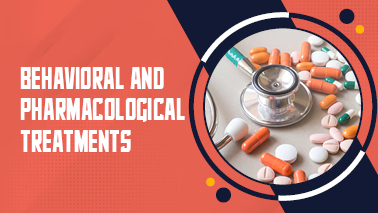
The treatment of Autism Spectrum Disorder (ASD) often involves a combination of behavioral and, in some cases, pharmacological interventions tailored to the individual's specific needs and challenges. Treatment plans should be individualized, taking into account the severity of symptoms and the unique strengths and weaknesses of the person with ASD.
Here's an overview of both types of treatments:
Behavioral Treatments:
Applied Behavior Analysis (ABA): ABA is a widely used and evidence-based approach that focuses on teaching specific skills and reducing problem behaviors by breaking them down into smaller, manageable steps. ABA is often used to improve communication, social skills, and adaptive behaviors. It may involve positive reinforcement techniques.
Early Intensive Behavioral Intervention (EIBI): EIBI is a type of ABA that is intensive and typically provided to young children with ASD. It involves one-on-one therapy for multiple hours per week and is aimed at maximizing developmental progress.
Social Skills Training: Social skills training programs help individuals with ASD improve their ability to interact and communicate with others. These programs teach skills like making eye contact, reading social cues, and initiating and maintaining conversations.
Speech and Language Therapy: Speech therapy is often used to address speech and language challenges in individuals with ASD. Therapists work on improving communication skills, speech articulation, and language comprehension.
Occupational Therapy (OT): OT can help individuals with ASD improve their fine and gross motor skills, sensory processing, and daily living skills. It can also address sensory sensitivities and self-regulation.
Behavioral Modification: Behavioral modification techniques are used to reduce challenging behaviors, such as tantrums, aggression, or self-injury. These approaches often involve identifying triggers, teaching alternative behaviors, and using positive reinforcement.
Structured Teaching and Visual Supports: Structured teaching methods, such as the TEACCH (Treatment and Education of Autistic and Related Communication Handicapped Children) program, use visual supports like schedules and visual cues to help individuals with ASD navigate daily routines and tasks.
Pharmacological Treatments:
Medication for Co-Occurring Conditions: Some individuals with ASD have co-occurring conditions, such as ADHD, anxiety, or depression. Medications like stimulants, selective serotonin reuptake inhibitors (SSRIs), or antipsychotic medications may be prescribed to manage these conditions when they significantly impact daily functioning.
Medication for Targeted Symptoms: In some cases, medication may be prescribed to address specific symptoms associated with ASD, such as irritability, aggression, or repetitive behaviors. For example, risperidone and aripiprazole are FDA-approved for treating irritability in children and adolescents with ASD.
Tags
Addiction Conferences
Addiction Therapy Conferences
Addiction Therapy Conferences 2023 Middle East
Cognitive Disorders Conferences
Addiction Research Conferences 2023 Europe
Clinical Psychiatry Conferences
Drug Abuse Conferences
Addiction Treatment Conferences
Behavioural Addiction Conferences 2023
Addiction Research Conferences 2023 USA
Addiction Medicine Conferences
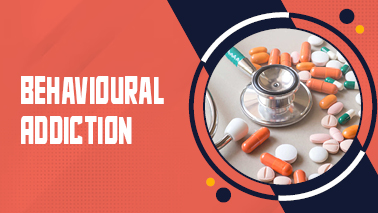
Behavioral addiction, also known as process addiction, refers to a pattern of repetitive, problematic behaviors that an individual cannot control despite negative consequences. Unlike substance addiction, which involves the abuse of drugs or alcohol, behavioral addiction centers around behaviors or activities that become compulsive and lead to significant impairment in one's life.
Here are some common examples of behavioral addictions:
Gambling Addiction (Pathological Gambling): Gambling addiction involves an uncontrollable urge to gamble, leading to significant financial, emotional, and interpersonal problems. Individuals with gambling addiction may continue to gamble despite mounting debts and losses.
Internet and Gaming Addiction: Excessive use of the internet, online gaming, or video gaming can lead to addiction. This may involve spending an excessive amount of time online or gaming, neglecting real-life responsibilities, and experiencing withdrawal symptoms when attempting to reduce usage.
Sex Addiction (Hypersexuality): Sex addiction is characterized by compulsive sexual behavior, including excessive sexual thoughts, acts, or engagement in risky sexual activities. This addiction can harm personal relationships and lead to legal and health issues.
Food Addiction (Binge Eating Disorder): Individuals with food addiction experience intense cravings for certain types of food, often high in sugar, fat, or salt. This leads to uncontrollable overeating, which can result in obesity and related health problems.
Shopping Addiction (Compulsive Buying Disorder): Shopping addiction involves compulsive and excessive shopping, often driven by emotional needs rather than practical necessity. It can lead to financial difficulties and strained relationships.
Exercise Addiction: Some individuals become addicted to exercise, engaging in extreme workouts even when injured or fatigued. This can have physical and psychological health consequences.
Workaholism: Work addiction, or workaholism, refers to an obsession with work and a compulsion to work excessively long hours, neglecting personal life and well-being.
Relationship Addiction (Love Addiction): Love addiction involves an intense preoccupation with romantic relationships, often leading to unhealthy, codependent patterns. Individuals may jump from one relationship to another in search of emotional fulfillment.
Compulsive Hair Pulling (Trichotillomania): Trichotillomania is characterized by the repetitive pulling out of one's hair, leading to hair loss and potential skin damage. It is often associated with anxiety or stress.
Compulsive Skin Picking (Excoriation Disorder): Excoriation disorder involves compulsive skin picking, resulting in skin damage and potential infections. It is often driven by anxiety or stress.
Tags
Addiction Treatment Conferences
Addiction Therapy Conferences 2023 China
Addiction Medicine Conferences
Addiction Therapy Conferences 2023 Middle East
Addiction Conferences
Drug Abuse Conferences
Addiction Psychiatry Conferences
Behavioural Addiction Conferences 2023
Addiction Research Conferences 2023 USA
Addiction Research Conferences 2023 Europe
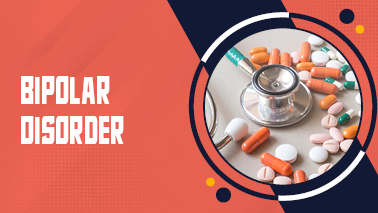
Bipolar disorder, formerly known as manic depression, is a chronic mental health condition characterized by extreme and often unpredictable mood swings. These mood swings typically include episodes of mania (elevated mood, increased energy, and impulsivity) and depression (low mood, fatigue, and feelings of hopelessness).
Here are some key aspects of bipolar disorder:
Types of Bipolar Disorder:
Bipolar I Disorder: In this type, individuals experience at least one manic episode that may be accompanied by depressive episodes or mixed episodes (simultaneous mania and depression).
Bipolar II Disorder: Bipolar II involves recurrent episodes of major depression and at least one hypomanic episode (less severe than full mania). Individuals with Bipolar II do not experience full-blown manic episodes.
Cyclothymic Disorder: Cyclothymic disorder is a milder form of bipolar disorder characterized by frequent periods of hypomania and depressive symptoms. These symptoms are less severe than those seen in Bipolar I or II.
Mania and Hypomania:
Manic episodes involve an elevated mood, increased energy, racing thoughts, reduced need for sleep, and impulsive behavior. Mania can lead to risky activities and impaired judgment.
Hypomanic episodes are similar to manic episodes but less severe. People with hypomania may be more productive and may not experience severe impairment in daily functioning.
Depressive Episodes:
Depressive episodes in bipolar disorder resemble major depressive disorder and include symptoms such as low mood, loss of interest or pleasure in activities, fatigue, changes in appetite, and thoughts of death or suicide.
Cycling Patterns: The cycling patterns of bipolar disorder can vary widely. Some individuals experience frequent mood swings, while others have longer periods of stability between episodes. The duration and severity of episodes can also vary.
Causes: The exact cause of bipolar disorder is not known, but it is believed to involve a combination of genetic, biological, and environmental factors. Brain chemistry and structure, as well as family history, play a role.
Treatment:
Medication: Mood-stabilizing medications, such as lithium, anticonvulsants (e.g., valproic acid), and atypical antipsychotics (e.g., olanzapine), are often prescribed to manage symptoms and stabilize mood.
Psychotherapy: Cognitive-behavioral therapy (CBT), interpersonal and social rhythm therapy (IPSRT), and family-focused therapy are commonly used psychotherapeutic approaches.
Lifestyle Management: Maintaining a regular sleep schedule, managing stress, avoiding alcohol and drug use, and adhering to medication regimens can help stabilize mood.
Impact on Daily Life: Bipolar disorder can significantly impact an individual's daily life, relationships, and work or school performance. It may also be associated with substance abuse, impulsive behavior, and legal or financial problems.
Suicide Risk: Individuals with bipolar disorder are at an increased risk of suicide, particularly during depressive episodes. Early recognition of warning signs and access to mental health care are crucial for suicide prevention.
Support and Coping: A strong support network, including family and friends, can be invaluable for individuals with bipolar disorder. Learning to recognize and manage triggers and symptoms is also important for coping with the condition.
Tags
Addiction Treatment Conferences
Clinical Psychiatry Conferences
Addiction Therapy Conferences 2023 Middle East
Behavioural Addiction Conferences 2023
Cognitive Disorders Conferences
Addictive Disorders Conferences
Addiction Medicine Conferences
Addiction Research Conferences 2023 Europe
Addiction Therapy Conferences
Addiction Research Conferences 2023 USA
Drug Abuse Conferences
Addiction Conferences
Addiction Research Conferences 2023 Asia
Addiction Conferences 2023
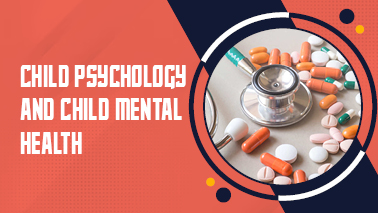
Child psychology and child mental health are fields of study and practice dedicated to understanding and promoting the psychological well-being and development of children and adolescents. These fields encompass a wide range of topics and concerns related to the mental, emotional, and behavioral aspects of young individuals.
Here are key aspects of child psychology and child mental health:
Developmental Stages: Child psychologists study the various stages of development that children go through, including infancy, early childhood, middle childhood, and adolescence. Understanding these stages helps professionals assess whether children are meeting developmental milestones.
Cognitive Development: This area focuses on how children acquire and process information, develop problem-solving skills, and learn language and communication. Key theories in cognitive development include those by Jean Piaget and Lev Vygotsky.
Social and Emotional Development: Child psychologists examine how children form attachments, develop social skills, and regulate their emotions. Erik Erikson's theory of psychosocial development is often used to understand the social and emotional challenges children face.
Behavioral and Emotional Disorders: Child mental health professionals work with children who experience various emotional and behavioral disorders, such as anxiety, depression, attention-deficit/hyperactivity disorder (ADHD), conduct disorders, and autism spectrum disorders.
Assessment and Diagnosis: Child psychologists and psychiatrists use standardized assessments, interviews, and observations to diagnose and evaluate children's mental health and behavioral issues. Accurate diagnosis is crucial for developing appropriate treatment plans.
Treatment and Intervention: Child mental health professionals employ a variety of therapeutic interventions to address children's mental health needs. These may include individual therapy, family therapy, play therapy, and behavior modification techniques. Medication may be considered for certain conditions.
Trauma and Adverse Childhood Experiences: Understanding and addressing trauma and adverse childhood experiences (ACEs) is essential in child mental health. Trauma-informed care emphasizes the importance of recognizing and responding to trauma to promote healing and resilience.
Parenting and Family Dynamics: Child psychologists often work with parents and families to improve parenting skills, create healthy family dynamics, and address conflicts or challenges within the family that may affect a child's mental health.
School and Education: Collaboration between child mental health professionals and schools is important to support students with mental health issues, learning disabilities, or behavioral challenges. Special education services may be provided when necessary.
Prevention and Early Intervention: Efforts to prevent mental health issues and promote early intervention are critical. This includes education and awareness campaigns, school-based mental health programs, and community resources.
Cultural Sensitivity: Recognizing and respecting cultural diversity is essential in child psychology and child mental health. Cultural factors can influence a child's development, understanding of mental health, and help-seeking behaviors.
Research and Policy: Ongoing research informs best practices in child psychology and child mental health. Policies related to child mental health services, access to care, and funding play a role in the availability and quality of services.
Tags
Addiction Therapy Conferences 2023 Middle East
Behavioural Addiction Conferences 2023
Addiction Conferences 2023
Addiction Therapy Conferences
Addiction Medicine Conferences
Addictive Disorders Conferences
Addiction Conferences
Addiction Psychiatry Conferences
Drug Abuse Conferences
Cognitive Disorders Conferences
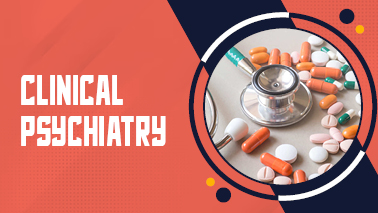
Clinical psychiatry is a medical specialty that focuses on the diagnosis, treatment, and prevention of mental illnesses and emotional disorders. Clinical psychiatrists are medical doctors (M.D.s or D.O.s) who have completed medical school and specialized training in psychiatry. They are trained to provide comprehensive psychiatric care, including assessment, medication management, psychotherapy, and other therapeutic interventions.
Here are key aspects of clinical psychiatry:
Assessment and Diagnosis: Clinical psychiatrists evaluate patients to diagnose mental health conditions. This involves conducting thorough psychiatric assessments, gathering medical and psychological histories, and using standardized diagnostic criteria (e.g., DSM-5) to identify specific disorders.
Medication Management: Psychiatrists are authorized to prescribe and manage medications for mental health conditions. They assess the need for psychiatric medications, prescribe them when appropriate, and monitor their effectiveness and side effects.
Psychotherapy: Many clinical psychiatrists are trained in various forms of psychotherapy, including cognitive-behavioral therapy (CBT), psychodynamic therapy, and interpersonal therapy. They may provide individual or group therapy to help patients address psychological and emotional issues.
Collaborative Care: Psychiatrists often work closely with other healthcare professionals, such as psychologists, social workers, nurses, and primary care doctors, to provide comprehensive care for patients with mental health concerns.
Inpatient and Outpatient Settings: Clinical psychiatrists can work in various settings, including hospitals, psychiatric units, outpatient clinics, private practices, and community mental health centers. They provide care to patients with a wide range of mental health needs.
Specialization: Some clinical psychiatrists choose to specialize in specific areas of psychiatry, such as child and adolescent psychiatry, geriatric psychiatry, addiction psychiatry, or forensic psychiatry. Specialization requires additional training and certification.
Emergency Psychiatry: Clinical psychiatrists may work in emergency departments to assess and manage individuals experiencing acute psychiatric crises, including suicidal ideation, psychosis, or severe anxiety.
Research: Some clinical psychiatrists engage in research to advance the field's understanding of mental health conditions, treatment approaches, and medications. Research findings contribute to evidence-based practices.
Ethical and Legal Considerations: Clinical psychiatrists adhere to ethical standards and legal regulations related to patient confidentiality, informed consent, and the use of psychiatric medications. They may also be involved in legal proceedings, such as competency evaluations.
Crisis Intervention: Psychiatrists are trained to provide crisis intervention and stabilization for individuals in severe distress or at risk of harm to themselves or others.
Continuing Education: Psychiatrists are required to engage in ongoing education and professional development to stay up-to-date with advancements in the field and maintain their medical licenses and board certifications.
Advocacy and Education: Many psychiatrists are advocates for mental health awareness and education, working to reduce the stigma associated with mental illness and improve access to mental health services.
Tags
Addiction Psychiatry Conferences
Addiction Therapy Conferences 2023 China
Addiction Medicine Conferences
Addictive Disorders Conferences
Addiction Treatment Conferences
Addiction Research Conferences 2023 Europe
Addiction Research Conferences 2023 Asia
Addiction Therapy Conferences 2023 Middle East
Addiction Conferences
Mental Health Confereces 2023
Cognitive Disorders Conferences
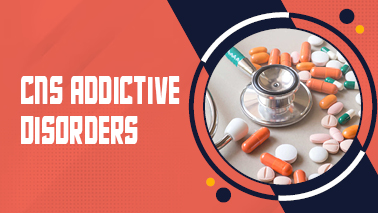
Central Nervous System (CNS) addictive disorders, also known as substance use disorders (SUDs) involving the CNS, refer to a group of conditions characterized by the misuse, abuse, or dependence on substances that affect the central nervous system. These substances can lead to addiction, a chronic and relapsing condition with physical and psychological dependence.
Here are some key aspects of CNS addictive disorders:
Types of Substances: CNS addictive disorders can involve various substances that directly affect the central nervous system, including but not limited to:
Alcohol: Alcohol use disorder (AUD) involves the abuse or dependence on alcoholic beverages.
Illicit Drugs: This category includes substances like opioids (e.g., heroin, prescription painkillers), cocaine, amphetamines, methamphetamine, hallucinogens, and others.
Prescription Medications: Misuse or abuse of prescription drugs, such as opioids, sedatives, and stimulants, can lead to CNS addictive disorders.
Tobacco: Nicotine addiction, primarily from cigarette smoking, affects the CNS and can lead to tobacco use disorder.
Cannabis: Although not exclusively a CNS depressant, cannabis use disorder involves problematic cannabis use and its impact on the CNS.
Diagnostic Criteria: CNS addictive disorders are diagnosed based on specific criteria outlined in the Diagnostic and Statistical Manual of Mental Disorders (DSM-5). Common criteria include cravings, tolerance, withdrawal, and unsuccessful attempts to quit or cut down on substance use.
Physical and Psychological Dependence: Individuals with CNS addictive disorders often experience both physical and psychological dependence. Physical dependence is characterized by withdrawal symptoms when the substance is discontinued, while psychological dependence involves a strong emotional need to use the substance.
Behavioral Symptoms: Individuals with CNS addictive disorders may engage in behaviors such as neglecting responsibilities, spending a significant amount of time obtaining or using the substance, and giving up important activities due to substance use.
Health Consequences: CNS addictive disorders can have severe health consequences, including organ damage, infectious diseases (e.g., HIV/AIDS from sharing needles), overdose, and mental health issues.
Co-Occurring Disorders: Many individuals with CNS addictive disorders also have co-occurring mental health disorders, such as depression, anxiety, or post-traumatic stress disorder (PTSD). These conditions often complicate treatment.
Treatment: Treatment for CNS addictive disorders may involve a combination of behavioral therapies (e.g., cognitive-behavioral therapy), medication-assisted treatment (e.g., methadone for opioid use disorder), support groups (e.g., Alcoholics Anonymous), and counseling. The choice of treatment depends on the specific substance and individual needs.
Recovery and Relapse: Recovery from CNS addictive disorders is possible, but it is often a lifelong process. Relapse can occur and is considered a common part of the recovery journey. The goal is to learn from relapses and continue working towards sobriety.
Stigma Reduction: Reducing the stigma associated with CNS addictive disorders is essential to encourage individuals to seek help and to promote understanding and compassion.
Prevention: Prevention efforts aim to educate individuals about the risks of substance abuse and to implement strategies to reduce the initiation of substance use, especially among youth.
Harm Reduction: Harm reduction strategies focus on minimizing the negative consequences of substance use, even if complete abstinence is not immediately achievable. Examples include needle exchange programs and supervised injection facilities.
Public Health Impact: CNS addictive disorders have a significant public health impact due to their widespread prevalence and associated health and social costs. Public health initiatives aim to address these issues on a larger scale.
Tags
Addiction Research Conferences 2023 USA
Behavioural Addiction Conferences 2023
Addiction Therapy Conferences
Addiction Therapy Conferences 2023 China
Addiction Therapy Conferences 2023 Middle East
Mental Health Confereces 2023
Addiction Conferences
Addiction Conferences 2023
Addictive Disorders Conferences
Addiction Research Conferences 2023 Europe
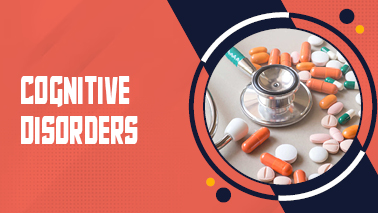
Cognitive disorders, also known as neurocognitive disorders, refer to a group of conditions characterized by significant impairments in cognitive functions such as memory, thinking, problem-solving, language, and perception. These disorders can have a profound impact on an individual's ability to perform everyday activities and maintain their independence. Cognitive disorders can result from various causes, including neurological conditions, brain injuries, and underlying medical conditions.
Here are some common types and aspects of cognitive disorders:
Alzheimer's Disease: Alzheimer's disease is the most well-known and prevalent cognitive disorder. It is a progressive brain disorder that primarily affects memory, leading to a decline in cognitive function, personality changes, and difficulties with daily living activities.
Vascular Dementia: Vascular dementia is caused by impaired blood flow to the brain, often due to strokes or other vascular conditions. Symptoms can include memory loss, confusion, and problems with reasoning and judgment.
Frontotemporal Dementia (FTD): FTD is characterized by damage to the frontal and temporal lobes of the brain, leading to changes in personality, behavior, and language. Memory problems may be less prominent in the early stages.
Lewy Body Dementia: This type of dementia is characterized by the presence of abnormal protein deposits (Lewy bodies) in the brain. Symptoms include cognitive fluctuations, visual hallucinations, and motor difficulties similar to those seen in Parkinson's disease.
Parkinson's Disease Dementia: Some individuals with Parkinson's disease develop cognitive impairment, which can progress to dementia. It is characterized by cognitive decline in addition to the motor symptoms of Parkinson's disease.
Huntington's Disease: Huntington's disease is a genetic disorder that affects cognitive function, motor skills, and behavior. It often presents with involuntary movements (chorea), mood disturbances, and cognitive decline.
Traumatic Brain Injury (TBI): Cognitive disorders can result from traumatic brain injuries caused by accidents, falls, or other incidents. The severity of cognitive impairment can vary depending on the extent of the brain injury.
Mild Cognitive Impairment (MCI): MCI is a condition characterized by cognitive problems that are more severe than expected for a person's age but not as severe as dementia. It may progress to a more severe cognitive disorder.
Creutzfeldt-Jakob Disease (CJD): CJD is a rare, rapidly progressive neurodegenerative disorder caused by abnormal proteins called prions. It leads to severe cognitive and neurological impairment.
Delirium: Delirium is an acute and fluctuating cognitive disorder often caused by underlying medical conditions, infections, medication side effects, or substance withdrawal. It is characterized by confusion, disorientation, and altered consciousness.
Substance-Induced Cognitive Disorder: The abuse of substances such as drugs and alcohol can lead to cognitive impairment. Symptoms may be reversible with abstinence or appropriate treatment.
Infectious and Metabolic Causes: Certain infections, nutritional deficiencies, and metabolic disorders can lead to cognitive impairment. Prompt treatment of the underlying condition may improve cognitive function.
Diagnosis: Diagnosis of cognitive disorders often involves a comprehensive evaluation by healthcare professionals, including neurologists and neuropsychologists. Neuroimaging, laboratory tests, and cognitive assessments are used to determine the cause and severity of the cognitive impairment.
Treatment: Treatment of cognitive disorders varies depending on the underlying cause. It may include medication, cognitive rehabilitation, psychotherapy, and support services to help individuals and their families cope with the challenges of cognitive impairment.
Care and Support: Providing a safe and supportive environment, as well as assistance with daily living activities, is essential for individuals with cognitive disorders. Caregiver support and education are also crucial components of care.
Tags
Addiction Research Conferences 2023 Asia
Addiction Medicine Conferences
Addictive Disorders Conferences
Mental Health Confereces 2023
Drug Abuse Conferences
Addiction Therapy Conferences 2023 China
Addiction Research Conferences 2023 Europe
Addiction Therapy Conferences
Addiction Psychiatry Conferences
Clinical Psychiatry Conferences
Cognitive Disorders Conferences
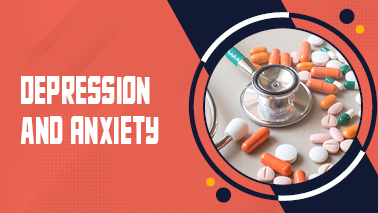
Depression and anxiety are two common mental health conditions that can significantly impact a person's emotional well-being, daily functioning, and overall quality of life. While they are distinct disorders, they often co-occur, and individuals may experience symptoms of both depression and anxiety simultaneously.
Here's an overview of each condition:
Depression:
Symptoms: Depression, also known as major depressive disorder (MDD), is characterized by persistent feelings of sadness, hopelessness, and a loss of interest or pleasure in activities that were once enjoyed. Other common symptoms include:
Causes: Depression can result from a complex interplay of genetic, biological, environmental, and psychological factors. Stressful life events, trauma, chronic medical conditions, and certain medications can contribute to the development of depression.
Treatment: Effective treatments for depression include:
Anxiety:
Symptoms: Anxiety disorders encompass a range of conditions, including generalized anxiety disorder (GAD), panic disorder, social anxiety disorder, and specific phobias. Common symptoms of anxiety disorders may include:
Causes: Anxiety disorders have various causes, including genetics, brain chemistry, trauma, and environmental stressors. A history of trauma, family history of anxiety disorders, and excessive stress can contribute to the development of anxiety.
Treatment: Treatment options for anxiety disorders may include:
Co-Occurrence:
It's common for individuals to experience both depression and anxiety simultaneously, a condition known as comorbid depression and anxiety. When these disorders co-occur, it can be especially challenging, as the symptoms may interact and exacerbate one another. Treatment typically involves addressing both conditions concurrently through therapy and, if necessary, medications.
Tags
Addiction Research Conferences 2023 Europe
Addictive Disorders Conferences
Addiction Treatment Conferences
Addiction Medicine Conferences
Addiction Therapy Conferences 2023 China
Addiction Psychiatry Conferences
Cognitive Disorders Conferences
Addiction Therapy Conferences 2023 Middle East
Clinical Psychiatry Conferences
Addiction Therapy Conferences
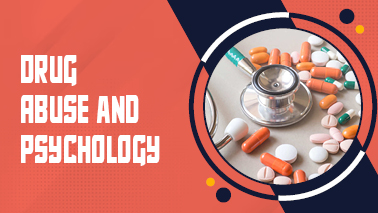
Drug abuse, also known as substance abuse, refers to the harmful or hazardous use of psychoactive substances, including alcohol and illicit drugs. This behavior can lead to various physical, psychological, and social consequences. The field of psychology plays a significant role in understanding the causes, effects, and treatment of drug abuse.
Here's how psychology is related to drug abuse:
Understanding Addiction Mechanisms: Psychology helps us understand the underlying mechanisms of addiction. It explores how substances can affect the brain's reward system, leading to cravings, dependence, and compulsive drug-seeking behavior. Psychological theories, such as the reward pathway and the role of neurotransmitters, shed light on addiction processes.
Behavioral Aspects: Behavioral psychology examines how drug abuse is learned and reinforced through conditioning. It looks at the role of environmental cues, stressors, and social contexts in promoting drug-seeking behavior. Classical and operant conditioning principles explain how associations between drug use and specific situations or emotions are formed.
Psychological Factors: Psychology acknowledges that individual differences play a significant role in drug abuse. Factors like personality traits, genetics, mental health conditions (e.g., depression and anxiety), and coping strategies can influence susceptibility to substance abuse. Psychologists study these factors to develop tailored prevention and treatment strategies.
Prevention and Education: Psychologists contribute to substance abuse prevention by designing and evaluating educational programs and interventions. They focus on improving knowledge, attitudes, and decision-making skills to reduce the likelihood of initiation or relapse.
Treatment Approaches: Psychology-based therapies are crucial in the treatment of drug abuse. Behavioral therapies, such as cognitive-behavioral therapy (CBT), contingency management, and motivational interviewing, are effective in helping individuals change their drug-using behaviors, manage cravings, and develop coping skills.
Dual Diagnosis: Many individuals with substance use disorders have co-occurring mental health disorders. Psychologists assess and treat both conditions simultaneously, addressing the interplay between substance abuse and psychological issues.
Relapse Prevention: Understanding the psychological triggers of relapse is essential. Psychologists help individuals identify high-risk situations, develop coping strategies, and build resilience to prevent relapse after treatment.
Family and Social Support: Psychology explores the role of family dynamics, social support, and social networks in both contributing to and helping to address substance abuse. Family therapy and interventions involving loved ones can be integral in recovery.
Community and Public Health: Psychologists contribute to public health efforts by studying the impact of substance abuse on communities and developing strategies for harm reduction and addiction treatment accessibility.
Recovery and Resilience: Psychology emphasizes the potential for recovery and resilience. It focuses on enhancing an individual's self-efficacy, motivation, and overall well-being during and after addiction treatment.
Research and Evidence-Based Practices: Psychology-based research informs evidence-based practices in addiction treatment. Researchers investigate new therapies, medications, and interventions to improve outcomes for individuals with substance use disorders.
Stigma Reduction: Psychologists work to reduce the stigma associated with substance abuse and addiction. This can encourage individuals to seek help without fear of judgment and discrimination.
Tags
Addiction Research Conferences 2023 Asia
Drug Abuse Conferences
Addiction Therapy Conferences
Addiction Therapy Conferences 2023 Middle East
Addiction Research Conferences 2023 USA
Addiction Therapy Conferences 2023 China
Addiction Conferences 2023
Clinical Psychiatry Conferences
Addictive Disorders Conferences
Addiction Medicine Conferences
Cognitive Disorders Conferences
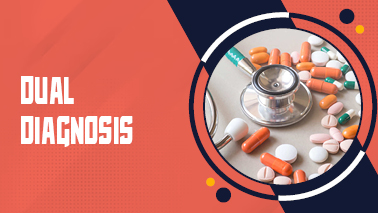
Dual diagnosis, also known as co-occurring disorders or comorbidity, refers to the presence of two or more distinct mental health conditions or disorders in an individual at the same time. In the context of substance abuse and mental health, dual diagnosis specifically refers to the coexistence of a substance use disorder (SUD) and one or more mental health disorders. It is a complex and challenging condition that requires integrated and specialized treatment approaches. Here are key aspects of dual diagnosis:
Prevalence: Dual diagnosis is relatively common. Many individuals who struggle with substance abuse also have underlying mental health conditions. Conversely, people with mental health disorders are at a higher risk of developing substance use disorders.
Types of Dual Diagnosis: Dual diagnosis can involve various combinations of mental health disorders and substance use disorders. Common co-occurring conditions include depression, anxiety disorders (e.g., generalized anxiety disorder, panic disorder), bipolar disorder, post-traumatic stress disorder (PTSD), and personality disorders.
Complex Interplay: The relationship between substance abuse and mental health disorders is complex. Substance use can exacerbate mental health symptoms, and vice versa. People may use substances to self-medicate or cope with their mental health symptoms.
Challenges in Diagnosis: Dual diagnosis can be challenging to diagnose because the symptoms of one condition can mask or mimic those of another. Accurate diagnosis requires a thorough assessment by a qualified mental health professional.
Integrated Treatment: Effective treatment for dual diagnosis involves an integrated approach that addresses both the substance use disorder and the mental health disorder simultaneously. Integrated treatment can include psychotherapy, medication management, and support services.
Medication Management: In some cases, medication may be prescribed to manage the symptoms of mental health disorders. This can be especially helpful for conditions like depression, anxiety, or bipolar disorder.
Therapeutic Interventions: Various psychotherapeutic approaches are used in dual diagnosis treatment, including cognitive-behavioral therapy (CBT), dialectical behavior therapy (DBT), and motivational interviewing. These therapies help individuals develop coping skills, manage cravings, and address underlying issues.
Relapse Prevention: Dual diagnosis treatment often includes relapse prevention strategies tailored to the individual's unique challenges. Identifying triggers and developing coping strategies are essential components.
Supportive Services: Individuals with dual diagnosis benefit from a range of supportive services, including case management, housing assistance, vocational training, and peer support. These services address the broader social and environmental factors that can affect recovery.
Long-Term Management: Dual diagnosis is a chronic condition, and long-term management is essential. Continuity of care, ongoing therapy, and support are crucial for maintaining recovery and managing both mental health and substance use issues.
Recovery-Oriented Approach: Recovery from dual diagnosis is possible. A recovery-oriented approach focuses on the individual's strengths, goals, and overall well-being. It emphasizes self-determination and hope for a fulfilling life in recovery.
Family and Social Support: Involving family members and loved ones in treatment and support is often beneficial. Family therapy and education can help improve understanding and communication.
Stigma Reduction: Reducing stigma associated with mental health and substance use disorders is essential. It encourages individuals to seek help without fear of judgment or discrimination.
Tags
Cognitive Disorders Conferences
Addictive Disorders Conferences
Addiction Therapy Conferences 2023 China
Addiction Therapy Conferences
Addiction Treatment Conferences
Behavioural Addiction Conferences 2023
Addiction Research Conferences 2023 Europe
Addiction Research Conferences 2023 USA
Addiction Medicine Conferences
Addiction Conferences
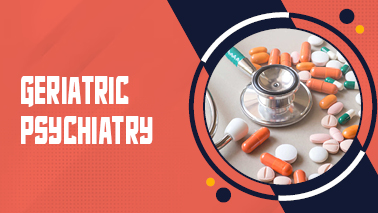
Geriatric psychiatry, also known as geropsychiatry, is a specialized field of psychiatry that focuses on the mental health and well-being of older adults, typically those aged 65 and older. Geriatric psychiatrists are trained to diagnose, treat, and prevent mental health disorders and emotional problems that are more common or unique to the elderly population.
Here are key aspects of geriatric psychiatry:
Prevalence of Mental Health Issues in Seniors: As individuals age, they may face an increased risk of various mental health conditions, including depression, anxiety, dementia (e.g., Alzheimer's disease), and late-life schizophrenia. Geriatric psychiatrists are equipped to address these specific challenges.
Physical and Psychological Factors: Geriatric psychiatrists consider the interaction between physical health and mental health. Chronic medical conditions, medications, cognitive changes, and social factors can all influence an older adult's mental well-being.
Diagnosis and Assessment: Geriatric psychiatrists conduct comprehensive assessments to diagnose mental health conditions accurately. These assessments may involve medical history, cognitive assessments, laboratory tests, and consultations with other healthcare professionals.
Depression and Anxiety: Depression and anxiety are among the most common mental health issues in older adults. They may present with atypical symptoms, such as physical complaints or cognitive impairment. Geriatric psychiatrists are skilled in recognizing these nuances.
Dementia and Cognitive Disorders: Geriatric psychiatrists specialize in evaluating and managing dementia and other cognitive disorders. Early diagnosis and intervention are critical for maximizing the quality of life and supporting caregivers.
Medication Management: Older adults may take multiple medications for various medical conditions. Geriatric psychiatrists are knowledgeable about potential drug interactions and the use of psychotropic medications in older populations.
Psychotherapy: Psychotherapeutic interventions, including individual, group, and family therapy, are integral to geriatric psychiatry. Therapies aim to address specific mental health issues and provide support for older adults and their families.
Long-Term Care and Rehabilitation: Geriatric psychiatrists often work in long-term care facilities, nursing homes, and rehabilitation centers to provide psychiatric care for residents. They address issues related to adjustment, behavioral disturbances, and the emotional challenges of aging.
Capacity and Decision-Making: Geriatric psychiatrists assess an older adult's capacity to make decisions, including medical, financial, and legal decisions. They may work with other professionals to ensure the person's rights and best interests are protected.
End-of-Life and Palliative Care: Geriatric psychiatrists may be involved in end-of-life care, addressing psychological and emotional issues related to terminal illnesses, grief, and bereavement.
Education and Support for Families: Families and caregivers play a crucial role in the well-being of older adults. Geriatric psychiatrists provide education, resources, and support to families dealing with the challenges of caring for elderly loved ones.
Interdisciplinary Approach: Geriatric psychiatry often involves collaboration with geriatricians, neurologists, social workers, and other healthcare professionals to provide comprehensive care.
Cultural Sensitivity: Geriatric psychiatrists recognize the importance of cultural and social factors in understanding and addressing mental health issues in older adults from diverse backgrounds
Tags
Addictive Disorders Conferences
Addiction Research Conferences 2023 Asia
Addiction Therapy Conferences 2023 Middle East
Drug Abuse Conferences
Addiction Research Conferences 2023 USA
Addiction Research Conferences 2023 Europe
Addiction Therapy Conferences
Behavioural Addiction Conferences 2023
Addiction Therapy Conferences 2023 China
Cognitive Disorders Conferences
Addiction Psychiatry Conferences
Addiction Conferences
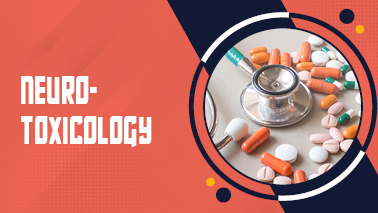
Neurotoxicology is a multidisciplinary field of study that focuses on understanding how chemicals and substances can adversely affect the nervous system. It examines the toxic effects of various substances, including environmental pollutants, industrial chemicals, pharmaceutical drugs, and natural toxins, on the structure and function of the nervous system.
Here are key aspects of neurotoxicology:
Neurotoxic Agents: Neurotoxicology investigates a wide range of neurotoxic agents, including heavy metals (e.g., lead, mercury), pesticides, solvents, drugs of abuse (e.g., cocaine, methamphetamine), environmental pollutants (e.g., air pollutants, pesticides), and naturally occurring toxins (e.g., venomous animal bites).
Routes of Exposure: Neurotoxic agents can enter the body through various routes of exposure, including inhalation, ingestion, dermal contact, and injection. Different routes of exposure may lead to distinct patterns of neurotoxic effects.
Mechanisms of Toxicity: Neurotoxicology research aims to elucidate the mechanisms by which these agents damage or disrupt the nervous system. This can involve interference with neurotransmission, oxidative stress, inflammation, disruption of the blood-brain barrier, and damage to neural cells (neurons and glial cells).
Acute vs. Chronic Effects: Some neurotoxic agents cause immediate, acute neurological effects, while others result in chronic or progressive damage over time. Understanding the timeline of neurotoxic effects is important for diagnosis and treatment.
Neurodevelopmental Toxicity: Neurotoxicology also examines how exposure to certain substances during critical periods of development (e.g., prenatal or early childhood) can lead to neurodevelopmental disorders, such as intellectual disabilities and learning disorders.
Assessment and Testing: Researchers in neurotoxicology develop methods and assays to assess neurotoxicity in experimental models and human populations. This includes neurobehavioral assessments, biomarker measurements, and neuroimaging techniques.
Risk Assessment: Neurotoxicology contributes to risk assessment and regulatory decision-making by providing data on safe exposure levels, setting occupational exposure limits, and guiding environmental regulations to protect public health.
Clinical Implications: Clinical neurotoxicologists diagnose and manage patients with suspected neurotoxic exposure. They may work with individuals exposed to occupational hazards, environmental toxins, or substances of abuse.
Treatment and Intervention: Understanding the mechanisms of neurotoxicity can inform treatment strategies for individuals with neurotoxic exposure. This may involve chelation therapy for heavy metal poisoning or supportive care for acute intoxication.
Environmental and Public Health Impact: Neurotoxicology research informs public health efforts to reduce exposure to neurotoxic agents in the environment and workplace. This includes efforts to mitigate exposure to lead in drinking water or reduce pesticide residues in food.
Neurotoxicology in Drug Development: The field is also relevant in drug development and safety evaluation. It helps identify potential neurotoxic effects of pharmaceutical drugs during preclinical and clinical testing.
Interdisciplinary Approach: Neurotoxicology often involves collaboration between toxicologists, neuroscientists, environmental scientists, epidemiologists, clinicians, and public health experts to address complex issues related to neurotoxic exposure and its consequences.
Tags
Drug Abuse Conferences
Addiction Conferences 2023
Addiction Psychiatry Conferences
Mental Health Confereces 2023
Addictive Disorders Conferences
Addiction Conferences
Addiction Research Conferences 2023 Europe
Addiction Therapy Conferences
Addiction Research Conferences 2023 Asia
Behavioural Addiction Conferences 2023
Addiction Therapy Conferences 2023 Middle East
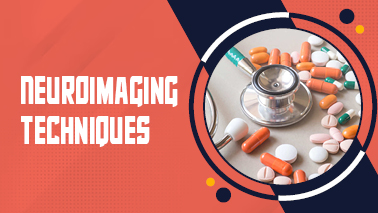
Neuroimaging techniques are a diverse set of tools and methods used to visualize and study the structure, function, and activity of the brain and nervous system. These techniques have revolutionized our understanding of the brain's anatomy and its role in various cognitive, emotional, and physiological functions. There are several primary neuroimaging techniques, each offering unique insights into the brain's workings.
Here are some of the most commonly used neuroimaging methods:
Structural Imaging:
Magnetic Resonance Imaging (MRI): MRI uses strong magnetic fields and radio waves to produce detailed, high-resolution images of the brain's structure. It is commonly used to visualize brain anatomy and detect abnormalities such as tumors, lesions, and atrophy. Functional MRI (fMRI) is a variation of MRI that can also capture brain activity.
Computed Tomography (CT): CT scans use X-rays to create cross-sectional images of the brain. While it is less detailed than MRI for soft tissue, CT is valuable for detecting hemorrhages, fractures, and other acute conditions.
Functional Imaging:
Positron Emission Tomography (PET): PET imaging involves injecting a radioactive tracer into the bloodstream, which is taken up by active brain cells. The emitted positrons are detected, and the data are used to create images that reflect brain activity and metabolism. PET is commonly used in neuroscience research and clinical assessment.
Single-Photon Emission Computed Tomography (SPECT): SPECT is similar to PET but uses different radioactive tracers and gamma cameras. It is used to assess brain blood flow and activity, particularly in clinical settings.
Functional Magnetic Resonance Imaging (fMRI): fMRI measures changes in blood flow and oxygenation in the brain to infer neural activity. It is widely used in cognitive neuroscience to study brain functions associated with tasks, emotions, and cognitive processes.
Near-Infrared Spectroscopy (NIRS): NIRS uses near-infrared light to measure changes in blood oxygenation and deoxygenation in the brain. It is portable and often used for studying brain function in infants and individuals with mobility limitations.
Diffusion Imaging:
Diffusion Tensor Imaging (DTI): DTI is a form of MRI that measures the diffusion of water molecules in brain tissues. It is used to visualize the brain's white matter tracts and assess the integrity of neural pathways, making it valuable for studying connectivity and conditions like traumatic brain injury.
Electroencephalography (EEG):
Electroencephalography (EEG): EEG records electrical activity generated by the brain's neurons using electrodes placed on the scalp. It provides high temporal resolution and is used to study brain waves, diagnose epilepsy, and explore cognitive processes.
Magnetoencephalography (MEG):
Magnetoencephalography (MEG): MEG measures the tiny magnetic fields generated by neural activity in the brain. It offers excellent temporal and spatial resolution and is valuable for studying brain function, particularly in research settings.
Invasive Techniques:
Intracranial EEG (iEEG): iEEG involves placing electrodes directly on or inside the brain to record electrical activity. It is used for precise localization of epileptic foci and has research applications in understanding neural function
Tags
Addiction Treatment Conferences
Addiction Conferences
Addiction Psychiatry Conferences
Addiction Therapy Conferences 2023 Middle East
Addiction Research Conferences 2023 Europe
Addictive Disorders Conferences
Clinical Psychiatry Conferences
Addiction Conferences 2023
Addiction Therapy Conferences
Mental Health Confereces 2023
Drug Abuse Conferences
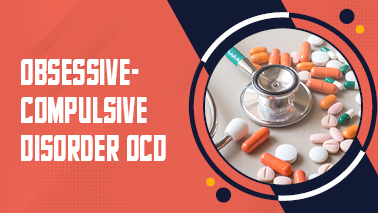
Obsessive-Compulsive Disorder (OCD) is a mental health condition characterized by the presence of persistent, intrusive, and distressing thoughts (obsessions) and repetitive behaviors or mental acts (compulsions). Individuals with OCD often engage in compulsions to reduce the anxiety and distress caused by their obsessions, but these compulsions provide only temporary relief. OCD can significantly interfere with daily life and functioning.
Here are key aspects of OCD:
Obsessions:
Intrusive Thoughts: People with OCD experience recurrent, unwanted, and distressing thoughts, images, or urges that intrude into their consciousness. These thoughts can be irrational, unpleasant, and often go against the individual's values.
Common Obsessions: Common themes of obsessions include fears of contamination, concerns about harming oneself or others, a need for symmetry or exactness, and disturbing sexual or religious thoughts.
Compulsions:
Repetitive Behaviors: Compulsions are repetitive physical or mental acts that individuals with OCD feel driven to perform in response to their obsessions. These behaviors are aimed at reducing the distress caused by the obsessions.
Common Compulsions: Examples of compulsions include excessive handwashing, checking locks or appliances, counting, repeating phrases, and mental rituals like silently praying or repeating words to counteract disturbing thoughts.
Impairment: OCD can cause significant impairment in daily functioning, relationships, and overall quality of life. It can be time-consuming and interfere with work, school, and social activities.
Insight: Many individuals with OCD recognize that their obsessions and compulsions are irrational or excessive. This is known as having insight into the disorder. However, even with insight, they may find it challenging to resist the compulsions.
Onset: OCD often begins in childhood, adolescence, or early adulthood. It can have a gradual or sudden onset.
Causes: The exact causes of OCD are not fully understood, but it is believed to involve a combination of genetic, neurological, and environmental factors. Abnormalities in brain circuitry and neurotransmitter imbalances may play a role.
Comorbidity: OCD frequently co-occurs with other mental health conditions, such as depression, anxiety disorders, and eating disorders. These comorbid conditions can complicate diagnosis and treatment.
Diagnosis: Diagnosis of OCD is typically made based on a clinical assessment by a mental health professional. There are standardized assessment tools and diagnostic criteria outlined in the Diagnostic and Statistical Manual of Mental Disorders (DSM-5).
Treatment:
Cognitive-Behavioral Therapy (CBT): Exposure and Response Prevention (ERP), a form of CBT, is the most effective psychotherapy for OCD. It involves gradually exposing individuals to their obsessions while preventing the compulsive behaviors.
Medication: Selective serotonin reuptake inhibitors (SSRIs) are often prescribed to manage the symptoms of OCD. These medications can help reduce the frequency and intensity of obsessions and compulsions.
Lifestyle and Coping Strategies: Lifestyle modifications, stress management, and relaxation techniques can complement therapeutic approaches to managing OCD.
Support Groups: Support groups and therapy groups can provide individuals with OCD a safe space to share their experiences, gain insights, and receive encouragement from others facing similar challenges.
Long-Term Management: OCD is a chronic condition, but with appropriate treatment, individuals can learn to manage their symptoms effectively and lead fulfilling lives.
Tags
Addiction Conferences 2023
Clinical Psychiatry Conferences
Addiction Research Conferences 2023 USA
Addiction Medicine Conferences
Addictive Disorders Conferences
Addiction Research Conferences 2023 Asia
Addiction Therapy Conferences 2023 Middle East
Addiction Therapy Conferences
Addiction Research Conferences 2023 Europe
Behavioural Addiction Conferences 2023
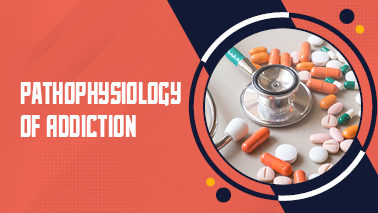
The pathophysiology of addiction is a complex process involving changes in the brain and the body that lead to the development and maintenance of substance use disorders. It is influenced by genetic, environmental, and psychological factors.
Here is an overview of the key components of the pathophysiology of addiction:
Reward Pathway and Dopamine: One of the central mechanisms in addiction involves the brain's reward pathway, particularly the release of the neurotransmitter dopamine. When a person engages in activities that promote survival (e.g., eating, sex), the brain's reward system is activated, reinforcing the behavior. Drugs of abuse, such as opioids, stimulants, and alcohol, can hijack this system by causing an unnatural surge in dopamine levels, leading to intense feelings of pleasure and euphoria.
Neuroadaptation: With repeated drug use, the brain undergoes neuroadaptations in response to the excessive dopamine release. These changes can lead to reduced sensitivity to natural rewards (anhedonia) and an increased need for the drug to achieve the same level of pleasure (tolerance).
Craving and Compulsion: As addiction progresses, individuals experience intense cravings for the drug. Cravings are driven by changes in the brain's reward circuitry, and they can become a powerful motivator for continued drug use. Compulsion refers to the irresistible urge to use the drug, even in the face of adverse consequences.
Loss of Control: Loss of control over drug use is a hallmark of addiction. Despite a desire to quit or cut down, individuals find it difficult to do so. This loss of control is linked to changes in the brain's prefrontal cortex, which is responsible for decision-making, impulse control, and judgment.
Withdrawal: When the drug's effects wear off, individuals may experience withdrawal symptoms, which can be physically and emotionally distressing. Withdrawal symptoms contribute to the cycle of addiction by driving individuals to use the drug again to alleviate discomfort.
Craving Triggers: Environmental cues associated with drug use, such as places, people, and objects, can trigger intense cravings and relapse. These cues become associated with the drug's rewarding effects through a process called classical conditioning.
Neuroplasticity: The brain is highly adaptable, and it can undergo both short-term and long-term changes in response to drug use. These changes can include alterations in the number and function of neurotransmitter receptors, synaptic connections, and brain regions involved in motivation and decision-making.
Genetic Vulnerability: Genetic factors can increase an individual's susceptibility to addiction. Certain genes may affect the way the brain responds to drugs, influences the likelihood of developing tolerance and dependence, and contributes to the risk of addiction.
Environmental Factors: Environmental factors, such as exposure to stress, trauma, peer pressure, and availability of drugs, play a significant role in addiction vulnerability. Childhood experiences and social support systems can also influence the development of addiction.
Psychological Factors: Psychological factors, including mental health disorders like depression and anxiety, can increase the risk of addiction. Individuals may use drugs as a way to self-medicate and alleviate emotional distress.
Cycle of Escalation: Addiction often follows a pattern of escalation, where individuals need increasing amounts of the drug to achieve the desired effects, leading to higher tolerance and more severe withdrawal symptoms.
Tags
Addiction Psychiatry Conferences
Drug Abuse Conferences
Addiction Medicine Conferences
Addiction Research Conferences 2023 USA
Addiction Conferences 2023
Addiction Conferences
Clinical Psychiatry Conferences
Mental Health Confereces 2023
Addiction Therapy Conferences
Addiction Therapy Conferences 2023 China
Addictive Disorders Conferences
Cognitive Disorders Conferences
Behavioural Addiction Conferences 2023
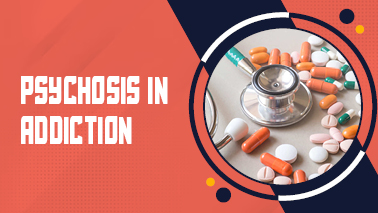
Psychosis is a mental health condition characterized by a disconnection from reality, leading to symptoms such as hallucinations (perceiving things that are not real) and delusions (false beliefs). When it occurs in the context of substance abuse or addiction, it is referred to as substance-induced psychosis. Psychosis in addiction is a complex and concerning issue, as it can lead to dangerous behaviors and complicate the treatment of both addiction and the psychotic symptoms.
Here are key points to understand about psychosis in addiction:
Causes of Substance-Induced Psychosis:
Substance Use: Psychosis can be triggered by the use of various substances, including stimulants (e.g., methamphetamine, cocaine), hallucinogens (e.g., LSD, PCP), cannabis, alcohol, and even some prescription medications.
Intoxication: Psychosis often occurs during or shortly after periods of substance intoxication, when the psychoactive effects of the drug are at their peak.
Withdrawal: In some cases, psychosis can also emerge during the withdrawal phase when an individual is discontinuing or reducing their use of certain substances.
Symptoms:
Hallucinations: These may involve seeing, hearing, or feeling things that are not present. Auditory hallucinations (hearing voices) are particularly common.
Delusions: People with substance-induced psychosis may hold false beliefs that are often paranoid or grandiose in nature.
Disorganized Thinking: Individuals may have difficulty organizing their thoughts and communicating coherently.
Agitation: Restlessness and agitation are common in substance-induced psychosis.
Impaired Insight: During the acute phase of psychosis, individuals may have impaired insight and not recognize that their experiences are not real.
Duration: Substance-induced psychosis is usually temporary and tends to resolve as the effects of the substance wear off. However, the duration and severity can vary depending on the substance and individual factors.
Risk Factors:
Sensitivity: Some individuals are more sensitive to the psychotic effects of certain substances.
Polydrug Use: Combining multiple substances can increase the risk of psychosis.
Preexisting Vulnerability: Individuals with a history of mental health conditions or a family history of psychosis may be more vulnerable.
Treatment:
Medical Evaluation: In cases of substance-induced psychosis, it is crucial to rule out any underlying medical conditions or injuries that may be contributing to the symptoms.
Stabilization: The primary goal is to stabilize the individual, which may involve providing a safe and calm environment.
Substance Withdrawal: In some cases, the substance causing the psychosis must be identified and managed, often through gradual withdrawal.
Medication: In severe cases or when symptoms persist, antipsychotic medications may be prescribed to alleviate psychotic symptoms.
Substance Abuse Treatment: Long-term treatment should address the underlying substance use disorder through therapy, counseling, and rehabilitation programs.
Long-Term Implications: While substance-induced psychosis is often temporary, repeated episodes or ongoing substance abuse can increase the risk of developing a primary psychotic disorder or other mental health conditions.
Tags
Addiction Conferences 2023
Addiction Conferences
Addiction Therapy Conferences
Addiction Psychiatry Conferences
Addiction Medicine Conferences
Mental Health Confereces 2023
Behavioural Addiction Conferences 2023
Addiction Research Conferences 2023 Asia
Addiction Therapy Conferences 2023 Middle East
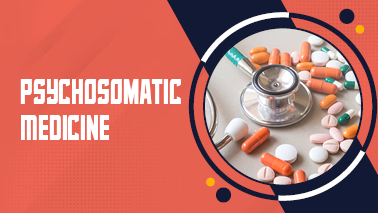
Psychosomatic medicine, also known as psychosomatics, is a medical and psychiatric subspecialty that focuses on the interaction between a person's mental, emotional, and psychological state and their physical health. It explores how psychological factors can influence physical well-being and the development and course of physical illnesses.
Here are key aspects of psychosomatic medicine:
Holistic Perspective: Psychosomatic medicine takes a holistic view of health, recognizing that mental and emotional factors can significantly impact physical health and vice versa. It emphasizes the mind-body connection.
Biopsychosocial Model: The field operates within the framework of the biopsychosocial model of health, which considers biological, psychological, and social factors as interconnected influences on a person's health and illness.
Mind-Body Interactions: Psychosomatic medicine investigates the ways in which psychological stress, emotions, personality traits, and coping mechanisms can affect the onset, course, and outcome of physical diseases. It also explores how physical illnesses can impact mental and emotional well-being.
Psychosomatic Disorders: Psychosomatic medicine examines specific psychosomatic disorders, which are physical conditions with a strong psychological or emotional component. Examples include irritable bowel syndrome (IBS), tension headaches, and somatic symptom disorders.
Psychological Factors in Chronic Illness: It addresses the role of psychological factors in chronic diseases such as heart disease, diabetes, autoimmune disorders, and cancer. Stress, depression, and anxiety can influence disease progression and treatment outcomes.
Placebo and Nocebo Effects: Psychosomatic medicine studies the placebo effect, where a patient experiences improvements in symptoms due to believing they are receiving treatment, even if the treatment is inert. Conversely, it also examines the nocebo effect, where negative expectations or beliefs can worsen symptoms.
Stress and Health: Chronic stress can have detrimental effects on physical health. Psychosomatic medicine investigates the mechanisms through which stress contributes to conditions like hypertension, immune system dysfunction, and gastrointestinal disorders.
Mind-Body Interventions: Psychosomatic medicine promotes the use of mind-body interventions, such as relaxation techniques, mindfulness, meditation, and cognitive-behavioral therapy (CBT), to help individuals manage stress and improve their overall well-being.
Collaborative Care: Collaborative care models involve multidisciplinary teams of healthcare professionals, including physicians, psychologists, psychiatrists, nurses, and social workers, working together to address both the physical and psychological aspects of a patient's health.
Prevention: Psychosomatic medicine emphasizes the importance of preventive measures, including stress management, healthy lifestyle choices, and early intervention for psychological distress, to reduce the risk of psychosomatic conditions.
Research and Education: Researchers in psychosomatic medicine conduct studies to better understand the mind-body connection and develop evidence-based interventions. Medical education programs include training in psychosomatic medicine to enhance physicians' understanding of the psychological aspects of health.
Patient-Centered Care: The field promotes patient-centered care, recognizing that understanding a patient's psychological and emotional experiences is crucial for effective diagnosis, treatment, and support.
Tags
Addiction Conferences 2023
Mental Health Confereces 2023
Addiction Therapy Conferences
Cognitive Disorders Conferences
Addiction Treatment Conferences
Addiction Research Conferences 2023 Europe
Behavioural Addiction Conferences 2023
Clinical Psychiatry Conferences
Addictive Disorders Conferences
Addiction Research Conferences 2023 Asia
Addiction Therapy Conferences 2023 Middle East
Addiction Conferences
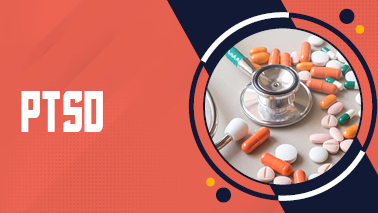
Post-Traumatic Stress Disorder (PTSD) is a mental health condition that can develop after an individual experiences or witnesses a traumatic event. PTSD can significantly impact a person's daily life and functioning.
Here are key aspects of PTSD:
Traumatic Events: PTSD is typically associated with exposure to a traumatic event. Trauma can take many forms, including but not limited to:
Symptoms: PTSD symptoms are grouped into four main categories:
Reexperiencing Symptoms: These include intrusive thoughts, flashbacks, nightmares, and distressing memories related to the traumatic event.
Avoidance and Numbing Symptoms: Individuals with PTSD often go to great lengths to avoid reminders of the trauma. They may also experience emotional numbness, detachment from others, and a reduced interest in activities they once enjoyed.
Hyperarousal Symptoms: Hyperarousal symptoms involve heightened states of anxiety and arousal. This can include irritability, difficulty sleeping, exaggerated startle response, and difficulty concentrating.
Negative Changes in Mood and Cognition: People with PTSD may experience negative changes in their mood and thought patterns. This can include feelings of guilt or shame, persistent negative beliefs about oneself or the world, and difficulty experiencing positive emotions.
Duration: To be diagnosed with PTSD, symptoms must persist for more than a month and cause significant distress or impairment in daily functioning. In some cases, symptoms may not appear until months or even years after the traumatic event.
Prevalence: PTSD can affect anyone who has experienced trauma, regardless of age, gender, or background. It is estimated that about 8% of the U.S. population will experience PTSD at some point in their lives.
Comorbidity: PTSD often co-occurs with other mental health conditions, including depression, anxiety disorders, substance use disorders, and dissociative disorders.
Biological and Psychological Factors: The development of PTSD is influenced by a combination of biological factors (e.g., genetics, neurobiology) and psychological factors (e.g., coping strategies, previous trauma history).
Treatment: PTSD is treatable, and several effective treatments are available, including:
Psychotherapy: Cognitive-Behavioral Therapy (CBT), particularly Prolonged Exposure (PE) and Cognitive Processing Therapy (CPT), is often used to treat PTSD. Eye Movement Desensitization and Reprocessing (EMDR) is another evidence-based therapy.
Medications: Antidepressant medications, particularly selective serotonin reuptake inhibitors (SSRIs), can help alleviate some of the symptoms associated with PTSD.
Self-Help Strategies: Techniques such as relaxation exercises, mindfulness, and stress management can be beneficial in managing PTSD symptoms.
Recovery: Many individuals with PTSD can experience significant improvements in their symptoms with appropriate treatment and support. Recovery may involve learning to manage symptoms and develop effective coping strategies.
Support: Support from friends, family, and support groups can play a crucial role in the recovery process. Social connections and a strong support network can provide emotional stability.
Tags
Addiction Treatment Conferences
Behavioural Addiction Conferences 2023
Addiction Conferences 2023
Addictive Disorders Conferences
Mental Health Confereces 2023
Addiction Conferences
Cognitive Disorders Conferences
Drug Abuse Conferences
Addiction Research Conferences 2023 USA
Addiction Therapy Conferences 2023 China
Addiction Medicine Conferences
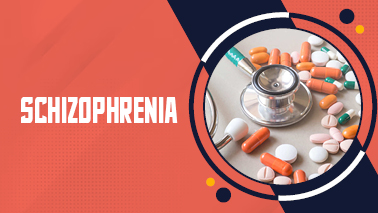
Schizophrenia is a complex and chronic mental health disorder characterized by a range of symptoms that affect a person's thinking, emotions, and behavior. It often involves a significant disruption in a person's perception of reality. Schizophrenia is one of the most severe and disabling mental illnesses, but with proper treatment and support, many individuals can manage their symptoms and lead fulfilling lives.
Here are key aspects of schizophrenia:
Symptoms:
Positive Symptoms: These involve the presence of abnormal experiences that are not typically seen in healthy individuals. Positive symptoms include hallucinations (false sensory perceptions, most commonly hearing voices), delusions (false beliefs, often with paranoid or grandiose themes), disorganized thinking, and disorganized or abnormal motor behavior.
Negative Symptoms: These involve the absence or reduction of normal emotional and behavioral responses. Negative symptoms include emotional flatness (reduced emotional expression), reduced motivation and pleasure in activities (anhedonia), social withdrawal, and cognitive deficits (e.g., impaired memory and attention).
Cognitive Symptoms: Some individuals with schizophrenia experience cognitive impairments that affect their ability to think clearly, make decisions, and maintain attention.
Onset and Course:
Etiology:
Diagnosis:
Diagnosis is typically made by a mental health professional based on a clinical assessment and the presence of specific symptoms outlined in diagnostic criteria (e.g., Diagnostic and Statistical Manual of Mental Disorders, DSM-5).
Careful evaluation is essential to rule out other medical or psychiatric conditions that may mimic schizophrenia.
Treatment:
Antipsychotic Medications: These drugs are the cornerstone of schizophrenia treatment and can help reduce positive symptoms. They work by modulating neurotransmitter activity, particularly dopamine.
Psychosocial Interventions: Various forms of therapy and psychosocial support, such as cognitive-behavioral therapy (CBT), family therapy, and vocational rehabilitation, can help individuals manage symptoms, improve functioning, and enhance quality of life.
Hospitalization: In severe cases or during acute episodes, hospitalization may be necessary for safety and stabilization.
Recovery and Management:
Stigma and Awareness:
Tags
Cognitive Disorders Conferences
Addictive Disorders Conferences
Addiction Treatment Conferences
Mental Health Confereces 2023
Drug Abuse Conferences
Addiction Therapy Conferences 2023 Middle East
Addiction Medicine Conferences
Addiction Conferences
Addiction Research Conferences 2023 Europe
Addiction Therapy Conferences
Addiction Research Conferences 2023 Asia
Addiction Conferences 2023
Addiction Psychiatry Conferences
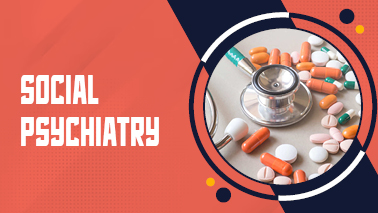
Social psychiatry is a subfield of psychiatry that focuses on the social, cultural, environmental, and interpersonal factors that influence mental health and mental illness. It emphasizes the interplay between an individual's mental well-being and their social context.
Here are key aspects of social psychiatry:
Social Determinants of Mental Health: Social psychiatry recognizes that various social determinants, such as socioeconomic status, education, employment, housing, and access to healthcare, significantly impact mental health. These determinants can either promote or undermine mental well-being.
Cultural and Ethnic Factors: Cultural and ethnic backgrounds play a crucial role in shaping an individual's beliefs, values, and experiences related to mental health and illness. Social psychiatry considers cultural competence and sensitivity when providing mental healthcare.
Social Stressors: Adverse life events, such as trauma, discrimination, violence, and social isolation, can contribute to the development of mental health disorders. Social psychiatry examines how exposure to these stressors can increase vulnerability to mental illness.
Social Support and Social Networks: Strong social support systems and healthy interpersonal relationships are protective factors for mental health. Social psychiatry explores the role of social networks in preventing and mitigating mental health issues.
Social Integration: The degree to which individuals are integrated into their communities and society at large can affect their mental health. Social psychiatry addresses issues related to social inclusion, stigma reduction, and community engagement.
Social Policy and Advocacy: Social psychiatry advocates for mental health policies that promote equity, social justice, and access to quality mental healthcare for all. It seeks to address social inequalities that contribute to mental health disparities.
Mental Health Promotion: In addition to treating mental illness, social psychiatry emphasizes the promotion of mental health and well-being through strategies that improve social conditions, reduce inequality, and enhance resilience.
Prevention and Intervention: Social psychiatry supports preventive measures that address social risk factors for mental illness. It also develops interventions that consider the broader social context of individuals and communities.
Research: Social psychiatry researchers study the complex interplay between social factors and mental health outcomes. This research informs the development of effective mental health programs and policies.
Multidisciplinary Approach: Social psychiatry often involves collaboration with professionals from various fields, including psychology, sociology, social work, public health, and community organizations, to address the multifaceted aspects of mental health.
Global Perspective: Social psychiatry recognizes that mental health is a global concern and considers cultural variations in beliefs and practices related to mental health. It also acknowledges the impact of global events and crises on mental well-being.
Community Mental Health Services: Social psychiatry supports the development of community-based mental health services that are accessible, culturally sensitive, and responsive to the social needs of individuals and communities.
Tags
Addiction Therapy Conferences 2023 Middle East
Addiction Medicine Conferences
Addiction Treatment Conferences
Drug Abuse Conferences
Mental Health Confereces 2023
Addictive Disorders Conferences
Addiction Conferences 2023
Addiction Therapy Conferences
Addiction Research Conferences 2023 USA
Addiction Research Conferences 2023 Europe
Addiction Research Conferences 2023 Asia
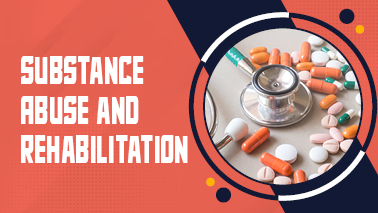
Substance abuse refers to the harmful or hazardous use of psychoactive substances, including alcohol and illicit drugs, leading to negative consequences on an individual's physical and mental health, social well-being, and overall quality of life. Rehabilitation for substance abuse involves a comprehensive process aimed at helping individuals overcome addiction, regain control of their lives, and achieve lasting recovery.
Here are key aspects of substance abuse and rehabilitation:
Substance Abuse:
Types of Substances: Substance abuse can involve a wide range of substances, including alcohol, opioids (e.g., heroin, prescription painkillers), stimulants (e.g., cocaine, methamphetamine), sedatives (e.g., benzodiazepines), cannabis, hallucinogens, and more.
Addiction: Repeated and prolonged substance abuse can lead to addiction, a chronic disease characterized by drug-seeking and use that is compulsive, or difficult to control, despite harmful consequences.
Physical and Mental Health Effects: Substance abuse can have serious physical and mental health consequences, including overdose, organ damage, mental disorders (e.g., depression, anxiety), and an increased risk of infectious diseases like HIV/AIDS.
Social and Legal Consequences: Substance abuse can strain relationships, lead to job loss, homelessness, financial problems, and legal issues such as arrests and imprisonment.
Risk Factors: Factors contributing to substance abuse include genetic predisposition, environmental influences, early exposure to substances, mental health issues, trauma, and stress.
Rehabilitation for Substance Abuse:
Assessment: The rehabilitation process often begins with a comprehensive assessment to evaluate the extent of substance abuse, co-occurring mental health disorders, and individual needs.
Detoxification: For individuals physically dependent on substances, medically supervised detoxification (detox) may be necessary to manage withdrawal symptoms safely. Detox alone does not constitute rehabilitation but is an important initial step.
Treatment Plans: Rehabilitation programs create individualized treatment plans that may include various components, such as psychotherapy, medication-assisted treatment (MAT), medical care, and social support.
Psychotherapy: Various forms of therapy are used, including cognitive-behavioral therapy (CBT), contingency management, motivational enhancement therapy (MET), and family therapy. These approaches address the psychological aspects of addiction, coping strategies, and relapse prevention.
Medication-Assisted Treatment (MAT): MAT combines medication with counseling and behavioral therapies to treat addiction to opioids, alcohol, and other substances. Examples include methadone, buprenorphine, and naltrexone.
Support Groups: Participation in self-help groups like Alcoholics Anonymous (AA) or Narcotics Anonymous (NA) can provide ongoing peer support and a sense of community for individuals in recovery.
Relapse Prevention: Learning skills to prevent relapse is a crucial part of rehabilitation. This involves identifying triggers, developing coping strategies, and building resilience.
Dual Diagnosis Treatment: For individuals with co-occurring mental health disorders, integrated treatment addresses both substance abuse and mental health issues simultaneously.
Recovery Support Services: These services help individuals reintegrate into society by providing housing assistance, job training, legal support, and educational opportunities.
Continuing Care: After completing a rehabilitation program, individuals benefit from ongoing care, including outpatient therapy, support groups, and regular follow-up appointments.
Family Involvement: Involving family members in the rehabilitation process can be beneficial for both the individual in recovery and their loved ones.
Long-Term Recovery: Achieving lasting recovery often requires ongoing commitment and lifestyle changes. Recovery is a process that may involve setbacks but can lead to a healthier, more fulfilling life.
Tags
Clinical Psychiatry Conferences
Addiction Conferences 2023
Addiction Psychiatry Conferences
Mental Health Confereces 2023
Addiction Medicine Conferences
Addiction Conferences
Addiction Research Conferences 2023 Europe
Addiction Therapy Conferences 2023 Middle East
Addiction Treatment Conferences
Addiction Research Conferences 2023 USA
Addiction Therapy Conferences 2023 China
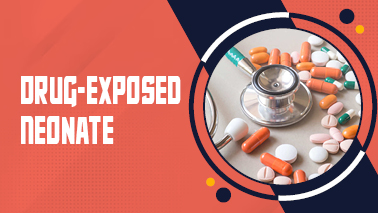
A drug-exposed neonate, also known as a neonatal abstinence syndrome (NAS) baby, refers to a newborn who has been exposed to drugs, typically opioids or other substances, during pregnancy due to maternal substance abuse. When a pregnant person uses drugs, these substances can pass through the placenta and affect the developing fetus. As a result, the newborn may experience withdrawal symptoms shortly after birth.
Here are key points to understand about drug-exposed neonates:
Common Substances: Opioids (such as heroin, prescription painkillers, or methadone), benzodiazepines, cocaine, amphetamines, and certain prescription medications are among the substances that can lead to NAS when used by pregnant individuals.
Symptoms of NAS: NAS occurs when the drug-exposed newborn experiences withdrawal symptoms as their body attempts to adapt to the absence of the drug. Common symptoms may include:
Onset and Duration: NAS symptoms typically begin within a few days to a week after birth, depending on the substance involved and its half-life. The duration and severity of symptoms can vary widely among infants.
Assessment and Diagnosis: Healthcare providers assess newborns for NAS using standardized scoring systems, such as the Finnegan Score or the Lipsitz Score. These tools help quantify the severity of withdrawal symptoms and guide treatment decisions.
Treatment: The primary goal of NAS treatment is to alleviate symptoms and ensure the baby's well-being. Treatment options may include:
Pharmacological Treatment: In severe cases, infants may receive medications such as morphine or methadone to help manage withdrawal symptoms. These medications are administered in a controlled and monitored manner to prevent overmedication and addiction.
Non-Pharmacological Measures: Comfort measures, including swaddling, soothing techniques, and providing a quiet environment, can help reduce distress.
Breastfeeding: In some cases, breastfeeding can be beneficial, as it provides comfort and nutrition. However, decisions about breastfeeding should be made in consultation with healthcare professionals, taking into account maternal substance use and other factors.
Long-Term Care: Drug-exposed neonates may require ongoing monitoring and support. Healthcare providers and social services may be involved to ensure the baby's safety and the well-being of the family.
Prevention: Preventing drug exposure during pregnancy is essential to avoiding NAS. Healthcare providers play a crucial role in identifying substance use disorders in pregnant individuals and connecting them with appropriate treatment and support services.
Legal and Ethical Considerations: NAS raises legal and ethical questions about the rights and responsibilities of pregnant individuals, the role of healthcare providers, and child protective services' involvement. Laws and regulations vary by jurisdiction.
Multidisciplinary Approach: Treating drug-exposed neonates often requires a multidisciplinary team, including neonatologists, nurses, social workers, addiction specialists, and pediatricians, to provide comprehensive care and support to both the newborn and the family.
Tags
Addiction Medicine Conferences
Addiction Conferences
Clinical Psychiatry Conferences
Mental Health Confereces 2023
Addiction Research Conferences 2023 Asia
Drug Abuse Conferences
Addictive Disorders Conferences
Addiction Therapy Conferences 2023 China
Addiction Research Conferences 2023 USA
Cognitive Disorders Conferences
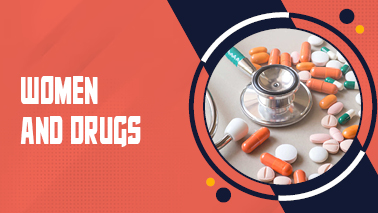
Women and drug use is a complex and multifaceted issue that involves a range of social, psychological, and health-related factors. Substance use among women can have unique challenges and consequences, and it is important to address these issues with a gender-specific approach.
Here are key points to consider regarding women and drug use:
Prevalence: Substance use affects women of all ages and backgrounds. The prevalence of drug use varies depending on the type of substance, geographic location, and cultural factors.
Patterns of Use:
Alcohol: Women are at risk of developing alcohol use disorders, and the consequences of heavy drinking can be more severe in women due to physiological differences. Binge drinking is a concern among young women.
Prescription Medications: Misuse of prescription medications, particularly opioids and sedatives, is a growing problem among women.
Illicit Drugs: Women use a variety of illicit drugs, including cannabis, cocaine, methamphetamine, and heroin. The reasons for drug use may differ among women.
Unique Challenges for Women:
Biological Differences: Women may experience more rapid progression from initial drug use to addiction, and they may be more susceptible to cravings and relapse.
Pregnancy: Substance use during pregnancy can harm the developing fetus and lead to neonatal abstinence syndrome (NAS) or other complications.
Hormonal Changes: Hormonal fluctuations during the menstrual cycle and menopause can influence drug cravings and withdrawal symptoms.
Co-Occurring Disorders: Women with substance use disorders are more likely to have co-occurring mental health conditions, such as depression, anxiety, or eating disorders.
Trauma and Violence: Many women who use drugs have experienced trauma, including physical or sexual abuse, which can contribute to substance use as a coping mechanism.
Social and Cultural Factors:
Stigma: Women who use drugs may face stigma and discrimination, which can discourage them from seeking help.
Social Support: The quality of social support networks, including family and peers, can influence women's substance use and recovery.
Economic Disparities: Economic factors, such as poverty and lack of access to healthcare, can impact substance use and treatment options.
Barriers to Treatment:
Pregnancy and Parenting:
Recovery and Relapse Prevention:
Prevention and Education:
Tags
Addiction Conferences 2023
Addiction Medicine Conferences
Addictive Disorders Conferences
Addiction Conferences
Behavioural Addiction Conferences 2023
Drug Abuse Conferences
Cognitive Disorders Conferences
Addiction Psychiatry Conferences
Addiction is a serious concern to public health that continues to harm millions of people globally, even though the revolutionary COVID-19 epidemic is currently waging war on the world's population.
Worldwide, about 6 million people die from tobacco addiction each year, and the numbers are steadily rising. According to the National Institute on Drug Abuse, about 54% of drug addicts in the US are under the age of 18. Additional factor that is anticipated to fuel the expansion of the global addiction treatment market is the alarming statistics in other parts of the world that have prompted government officials to spread awareness about addiction treatment.
The estimated size of the global market for substance abuse treatment was USD 5,089.69 million in 2021, USD 5,546.23 million in 2022, and it is anticipated to increase at a CAGR of 9.14% to reach USD 8,605.25 million by 2027.
The global addiction treatment industry is expected to reach a market size of approximately US$ 12 Billion by the year 2030 as a result of these factors and on-going emphasis on research and development activities.
Market insights of Addiction Medicine in Europe:
The market for addiction therapeutics in Europe is anticipated to grow from US$ 1,410.85 million in 2019 to US$ 2,147.19 million in 2027. From 2020 to 2027, the market is anticipated to expand at a CAGR of 5.5%.
The expansion of the market can be attributed to the increased approval of novel medications, the development of digital therapeutics for the treatment of addiction, the execution of various awareness programs, and government measures to combat drug abuse and advance medication. The market for addiction therapy is rising, but it is hampered by the high development costs of new medications.
Market insights of Addiction Medicine in Asia Pacific:
The Asia Pacific Addictions Therapeutics market is anticipated to grow from US$ 1,060.33 million in 2019 to US$ 1,781.09 million in 2027.
Market insights of Addiction Medicine in Middle East:
The market for addiction therapeutics in the Middle East and Africa is anticipated to grow from US$172.05 million in 2019 to US$223.05 million in 2027. The market is anticipated to expand at a CAGR of 3.4% between 2020 and 2027.
The market for mental health services worldwide, which was valued at $383.31 billion in 2020, is expected to increase to $537.97 billion by 2030, at a CAGR of 3.5%.
In 2023, the market for mental health is expected to generate US$5.69 billion in revenue.
By 2027, the market is projected to reach a value of US$5.84 billion, with a revenue growth rate (CAGR 2023–2027) of 0.69% each year.
In terms of global comparison, the United States will produce the most revenue ($11,450.00m in 2023).
In 2023, per-person revenues of US$177.00 are produced based on population statistics.
Psychiatry Market in Europe
The Mental Health industry is anticipated to generate $5.69 billion in revenue by 2023. Assuming a 0.69 percent compound annual growth rate from 2023 to 2027, the market size will reach $5.84 billion by 2027.
One of the major factors driving the expansion of the European psychiatric therapy industry is the increasing prevalence of depression and mental disorders. Worldwide, 350 million people suffer from depression and other mental disorders (WHO). Schizophrenia affects 24 million individuals. Increasingly, researchers are investigating a variety of treatments for complex mental health issues. Anorexia is also caused by anxiety, melancholy, and obsessive-compulsive disorder. We have analyzed more than 17,000 cases of anorexia in order to determine the underlying causes.
Market insights of Psychiatry in Asia-Pacific
Market valuation for anxiety and depression treatment was $17,770.9 million in 2020, and it's predicted to be $24,467.7 million by 2030. Market research firm P&S Intelligence predicts the market will grow 3.3% from 2021 to 2030.
APAC Mental Health Software Market size was USD 0.31 Billion in 2022 and is expected to grow at a CAGR of 14.86% to USD 0.62 Billion by 2027.
The Global Mental Wellness Market was estimated to be worth US$75 billion in 2017 by Ken Research Analysis. The market for mental wellness will be driven by the rise in busy lifestyles, bad diets, a lack of physical activity, and long work hours in today's culture, which contribute to mental illnesses/disorders like depression, anxiety, eating disorders, and others. Another factor contributing to the rise of people with mental health disorders is the ageing of the elderly population.
It is expected to reach a market value of US$ 150 billion by 2028 and is likely to develop at a CAGR of 6% from 2022 to 2028.
Market insights of Psychiatry in Middle East
The Global Brain Health Products Market was estimated by Ken Research Analysis to be worth $5 billion in 2017. This market is expected to grow significantly over the course of the projected period due to consumers' shift toward proactive health and wellness and their focus on increasing their brain health and longevity. It is projected to be worth $8 billion in 2022 and to increase at a CAGR of 10% from 2022 to 2028, reaching a market value of $15 billion.
__________________________________________________________________________________________________________________________________________________________________________
List of Addiction Medicine Hospitals
John Hopkins Medicine / Massachusetts General Hospital / Cygnet Health Care / Southern Hill Hospital / Priory Hospital, Bristol / VIMHANS- Vidyasagar Institute of Mental Health, Neuro & Allied Sciences / NIMHANS- National Institute of Mental Health and Neurosciences / Institute Of Mental Health, Singapore / Centre for Addiction and Mental Health, Canada / McLean Hospital, Belmont, Massachusetts, USA / The Centre for Addiction and Mental Health (CAMH), Canada / Northumberland, Tyne and Wear NHS Foundation Trust / Clinic Les Alpes, Montreux, Switzerland / Institute of Mental Health, Singapore, Asia / The Kusnacht Practice, Zurich’s Gold Coast, Switzerland / Massachusetts General Hospital / New York-Presbyterian Hospital-Columbia and Cornell / UCSF Health-UCSF Medical Center / Stewart and Lynda Resnick Neuropsychiatric Hospital at UCLA / Mayo Clinic / Yale New Haven Hospital / Sheppard Pratt Hospital / Menninger Clinic / NYU Langone Hospitals / Stanford Health Care-Sanford Hospital / UPMC Presbyterian Shadyside / University of Utah Hospital / NYC Health and Hospitals-Bellevue / Vanderbilt University Medical Center / Brigham and Women's Hospital / Mount Sinai Hospital / NP Istanbul Brain Hospital / Emsey Hospital / IsraClinic / NP Istanbul Brain Hospital / ISU Gaziosmanpasa / Hisar Intercontinental Hospital / Emsey Hospital / Kardiolita Hospital / Lokman Hekim Istanbul Hospital / Medistate Hospital Istanbul / Medicana Sivas Hospital / Medicana Bahcelievler Hospital / Avicenna International Hospital / Liv Bona Dea Hospital Baku / Matzpen Mental Health Center / Aster Hospitals, DUBAI / Yeditepe University Hospital / Reyap Hospital / Lokman Hekim Akay Hospital / VIP Vorobjev Clinic / Avicenna International Hospital / Medicana Camlica Hospital / Hospital HM Sanchinarro / Udensroze clinic / Derindere Hospital / Hospital HM Puerta del Sur / Renova Style Clinic / Private Optimed Hospital / Medlux Psychological Care and Substance Abuse Treatment Center / Liv Bona Dea Hospital Baku / Grand Clinic / Aster Hospitals, DUBAI / Centro Médico Teknon / Memorial Şişli Hospital / Memorial Antalya Hospital / Sourasky Medical Center / Asklepios Hospital Barmbek / Nordwest Clinic (Krankenhaus) / Memorial Bahcelievler Hospital / Quironsalud Madrid / Döbling Private Hospital / Asklepios St. Georg Clinic / Zulekha Hospital Dubai / HM Hospitales / Nordrhein-Westfalen Clinic Complex / Helios Hospital Berlin Buch / Memorial Ankara Hospital / Reuth Rehabilitation Сenter / Vitality Medical & Research Center / Abromiskes Rehabilitation Center / Artemis Hospitals / Samsung Medical Center / Gangnam Severance Hospital / Severance Hospital / State Hospital Edith Wolfson / Manipal Goa Hospital / Schneider Center for Children Medicine / Vienna General Hospital (AKH) / Düsseldorf Clinics Association / Gachon University Gil Medical Center / BLK Super Speciality Hospital / Hospital Quiron Barcelona / Sheba Medical Center / Loewenstein hospital Rehabilitation center / Rabin Medical Center / Bumrungrad International Hospital / Seoul National University Bundang Hospital (SNUBH) / Asklepios Nord Clinic / Rambam Medical Center / Confraternitaet Private Hospital / LIV Hospital / Schlosspark Clinic / Medical Diagnostic and Treatment Center / Acibadem Health Group / Behman Psychiatric Hospital /
List of Addiction Medicine universities in Asia-pacific
Jami University / Al-Beroni University / Ghalib University / Herat University / Ibne-sina Balkh Medical School / Kabul Medical University / Kandahar University / Nangarhar University / Spinghar Higher Education Centre / Armenian Medical Institute / Yerevan Haybusak University / Yerevan State Medical University / Yerevan University of Traditional Medicine / Azerbaijan Medical University / International University, Cambodia (IU) / University of Health Sciences – Cambodia (UHS-C) / University of Puthisastra (UP) / Akaki Tsereteli State University / David Agmashenebeli University of Georgia / Tbilisi State Medical University / Tbilisi State University / Tbilisi Medical Academy / David Tvildiani Medical University / Hashemite University / Jordan University of Science and Technology / Mutah University / University of Jordan / NJSC Astana Medical University / Karaganda State Medical University / Kazakh National Medical University / Semipalatinsk State Medical Academy / South Kazakhstan State Medical Academy / West Kazakhstan Marat Ospanov State Medical University / Kazakh-Russian Medical University / Osh State University / Asian Medical Institute / International Higher School of Medicine / Jalalabad State University / Kyrgyz-Russian Slavic University / Kyrgyz State Medical Academy / Medical Institute, Osh State University / International Medical Institute / Adam University / University of Health Sciences / American University of Beirut / Holy Spirit University of Kaslik / Lebanese American University / Lebanese University / University of Balamand / Université Saint Joseph / Inner Mongolia Medical University / Mongolian National University / Defence Services Medical Academy (DSMA) / University of Dental Medicine / University of Medicine / University of Nursing / University of Medical Technology / University of Traditional Medicine / Chongjin Medical University / Haeju Medical University / Hamhung Medical University / Hyesan Medical University / Kanggye Medical University
Pyongsong Medical University / Pyongyang Medical University / Sariwon Medical University / Sinuiju Medical University / Wonsan Medical University / B.P. Koirala Institute of Health Sciences / College of Medical Sciences / Kathmandu University School of Medical Sciences / KIST Medical College, Kathmandu / Lumbini Medical College / Manipal College of Medical Sciences / National Academy of Medical Sciences / Nepal Army Institute of Health Sciences / Nobel Medical College, Biratnagar / Patan Academy of Health Sciences / Al-Quds University Faculty of Medicine / An-Najah National University Faculty of Medicine and Health Sciences / Arab American University Faculty of Medicine / Hebron University College of Medicine / Islamic University of Gaza Faculty of Medicine / Palestine Polytechnic University College of Human Medicine / Alfaisal University / Ibn Sina National College for Medical Studies / Imam Muhammad ibn Saud Islamic University / King Faisal University / King Saud bin Abdulaziz University for Health Sciences / King Saud University / Majmaah University / Northern Borders University / Qassim University / Umm al-Qura University / University of Seychelles - American Institute of Medicine / Duke–NUS Medical School (National University of Singapore) / Lee Kong Chian School of Medicine (Nanyang Technological University) / Yong Loo Lin School of Medicine (National University of Singapore) / Wayamba University of Sri Lanka / Sabaragamuwa University of Sri Lanka / General Sir John Kotelawala Defence University / Rajarata University / South Asian Institute of Technology and Medicine / University of Colombo (formerly the Ceylon Medical College) / Institute of Indigenous Medicine / University of Jaffna / University of Kelaniya (formerly the North Colombo Medical College) / University of Peradeniya / University of Ruhuna / University of Sri Jayewardenepura / Open International University for Complementary Medicines / Tajik State Medical University / Turkmen State Medical University / Bukhara State Medical Institute, Bukhara / Tashkent Pediatric Medical Institute / Samarkand State Medical Institute / Can Tho University of Medicine and Pharmacy / Hai Phong Medical University / Hanoi Medical University / Ho Chi Minh City University of Medicine and Pharmacy / Huế College of Medicine and Pharmacy / University of Da Nang, School Of Medicine and Pharmacy / Thái Bình Medical University / Thái Nguyên University / Tra Vinh University / Vietnam National University, Hanoi / Vietnam National University, Ho Chi Minh City / Vinh Medical University /
List of Addiction Medicine universities in Europe
University of Oxford / University of Cambridge / University College London / Imperial College London / King’s College London / The University of Edinburgh / London School of Hygiene and Tropical Medicine / The University of Manchester / University of Glasgow / Queen Mary University of London / Karolinska Institute, Sweden / Heidelberg University, Germany / University of Amsterdam, the Netherlands / Erasmus University Rotterdam, the Netherlands / University of Copenhagen / LMU Munich, Germany / Sorbonne University / KU Leuven, Belgium / University of Zurich / University of Dundee / Utrecht University / University of Siena / Wroclaw Medical University / University of Szeged / Maastricht University / Sorbonne University / Erasmus University Rotterdam, the Netherlands / KU Leuven – University of Leuven / Heidelberg University / Charité - Universitätsmedizin / Karolinska Institute /
List of Addiction Medicine universities in Middle East
Arabian Gulf University / RCSI-Bahrain / Ain Shams University Faculty of Medicine / Al-Azhar University / Alexandria University Faculty of Medicine / Arab Academy for Science, Technology and Maritime Transport College of Medicine / Armed Forces College of Medicine / Assiut University Faculty of Medicine / Aswan University Faculty of Medicine / Badr University in Cairo School of Medicine / Benha University College of Human Medicine / Beni Suef University Faculty of Medicine / Cairo University Kasr Alainy School of Medicine / Delta University for Science and Technology Faculty of Medicine / Fayoum University Faculty of Medicine / Galala University Faculty of Medicine / Helwan University Faculty of Medicine / Horus University Faculty of Medicine / Kafrelsheikh University Faculty of Medicine / King Salman International University Faculty of Medicine / Mansoura University Faculty of Medicine / Menoufia University Faculty of Medicine / Merit University Faculty of Medicine / Minia University Faculty of Medicine / Misr University for Science and Technology College of Medicine / Modern University for Technology and Information Faculty of Medicine / Nahda University in Beni Suef Faculty of Medicine / Newgiza University School of Medicine / New Mansoura University Faculty of Medicine / Port Said University Faculty of Medicine / Sohag University Faculty of Medicine / South Valley University Qena Faculty of Medicine / Suez University Faculty of Medicine / Suez Canal University Faculty of Medicine / Tanta University Faculty of Medicine / Zagazig University Faculty of Medicine / Ahvaz Jundishapur University of Medical Sciences / Ali ebn Abitaleb Yazd Azad University of Medical Sciences / Arak University of Medical Sciences / Ardabil University of Medical Sciences / Azad University of Medical Sciences / Babol University of Medical Sciences / Baqiyatallah Medical Sciences University / Birjand University of Medical Sciences / Bushehr University of Medical Sciences / Dezful University of Medical Sciences / Fasa Faculty of Medical Sciences, Fasa / Fatemiye University of Medical Sciences / Golestan University of Medical Sciences / Gonabad University of Medical Sciences / Gorgan University of Medical Sciences / Guilan University of Medical Sciences / Hamedan University of Medical Sciences / Hormozgan University of Medical Sciences / Isfahan University of Medical Sciences / Medical University of Ilam / Iran University of Medical Sciences / Islamic Azad University Tehran Medical Branch / Islamic Azad University of Arak / Jahrom University of Medical Sciences / Kashan University of Medical Sciences / Kerman University of Medical Sciences / Kermanshah University of Medical Sciences / Kordestan University of Medical Sciences / Lorestan University of Medical Sciences / Mashhad University of Medical Sciences / Mazandaran University of Medical Sciences / Medical University of Ilam / Qazvin University of Medical Sciences / Qom University of Medical Sciences / Rafsanjan University of Medical Sciences / Sabzevar School of Medical Sciences / Semnan University of Medical Sciences / Shahed University of Medical Sciences / Shahid Beheshti University of Medical Sciences / Shahid Sadoughi University of Medical Sciences and Health Services / Shahrekord University of Medical Sciences / Shahroud University of Medical Sciences / Shiraz University of Medical Sciences / Tabriz University of Medical Sciences / Tehran University of Medical Sciences / Urmia University of Medical Sciences / Yasuj University of Medical Sciences / Yazd University of Medical Sciences / Zahedan University of Medical Sciences / Zanjn University of Medical Sciences / Zabol University of Medical Science / University of Kerbala / University of Duhok / Thi Qar University / Al-iraqiya university / University of Kirkuk / University of Baghdad / University of Baghdad / Al-Nahrain University / Al-Mustansiriya University / University of Mosul / University of Basrah / University of Babylon / University of Kufa / University of Anbar / University of Tikrit / University of Sulaymaniyah / Hawler Medical University / University of Al-Qadisiyah / University of Diyala / Ben-Gurion University of the Negev Medical School for International Health / Ben-Gurion University of the Negev / Hebrew University-Hadassah School of Medicine / Hebrew University of Jerusalem / Sackler Faculty of Medicine / Tel Aviv University / Medical school of the Bar-Ilan University / Ariel University / Jordan University of Science and Technology / Hashemite University – Faculty of Medicine / University of Jordan – Faculty of Medicine / Mutah University – Faculty of Medicine / Yarmouk University – Faculty of Medicine / Al-Balqa` Applied University – Faculty of Medicine / Kuwait University / Lebanese University / Beirut Arab University / Saint Joseph University / University of Balamand / Lebanese American University / American University of Beirut / Holy Spirit University of Kaslik / Sultan Qaboos University / Al-Quds University Faculty of Medicine / An-Najah National University Faculty of Medicine and Health Sciences / Arab American University Faculty of Medicine / Hebron University College of Medicine / Islamic University of Gaza Faculty of Medicine / Palestine Polytechnic University College of Human Medicine / Weill Cornell Medical College in Qatar / Qatar University / College of Medicine in Dawadmi / Shaqra University / College of Medicine, University of Bisha / Salman bin abdlaziz university / Alfaisal University / Imam Muhammad ibn Saud Islamic University / King Abdulaziz University / King Abdulaziz University / King Saud University / University of Dammam / King Faisal University / King Khalid University / Umm al-Qura University / Taif University / Al Qaseem University Buridah / Al Jouf University / Taibah University / King Saud bin Abdulaziz University for Health Sciences / Ibn Sina National College for Medical Studies, Jeddah (Private Medical School) / Batterjee Medical College, Jeddah (private Medical School) / University of Hail, Medicine college / Tabuk University / Al-Majmaah University, College of Medicine / Unaizah College of Medicine / University of Almaarefa / Faculty of Medicine, Damascus University / University of Kalamoon / Faculty of Medicine, Al-Baath University / Faculty of Medicine, Tishreen University / Syrian Private University / Al-Andalus University for Medical Sciences / Tartoos university faculty of medicine / Alhawash private university / United Arab Emirates / Dubai Medical College for Girls / Gulf Medical University Ajman / United Arab Emirates University / University of Sharjah / Mohammed Bin Rashid University Of Medicine and Health Sciences / Ras al-Khaimah Medical and Health Sciences University / Ajman University / Aden University / Hadhramout University of Science & Technology / Sana'a University / University of Science & Technology / Thamar University / Ibb University / Taiz university / Al-Razi University / University for Medical and Applied Science / Arabian Gulf University / Suez Canal University Faculty of Medicine / Tanta University, School of Medicine / University Center for International Education / Wright State University /
List of Best Techniques and counseling methods used in Addiction Medicine
Motivational Interviewing Cognitive Behavioral Therapy (CBT) / Dialectical Behavior Therapy (DBT) / Solution-Focused Therapy / Acceptance and Commitment Therapy (ACT) / Contingency Management / Rational Emotive Behavior Therapy (REBT) / Family Therapy / Group Therapy / Individual Counseling / Mindfulness-Based Interventions / Interpersonal Therapy / Eye Movement Desensitization and Reprocessing (EMDR) / Narrative Therapy / Trauma-Informed Care / Expressive Therapy (art, music, drama, etc.) / Play Therapy / Psychodynamic Therapy / Reality Therapy / Behavioral Activation Therapy / Self-Help Groups (AA, NA, etc.) / Holistic Therapies (e.g., acupuncture, massage, yoga) / 12-Step Facilitation Therapy / Client-Centered Therapy / Strengths-Based Therapy / Harm Reduction Therapy / Psychoanalytic Therapy / Attachment-Based Therapy / Brief Solution-Focused Therapy / Existential Therapy / Gestalt Therapy / Hypnotherapy / Internal Family Systems Therapy (IFS) / Life Skills Training / Meditation and Mindfulness / Multimodal Therapy / Non-Violent Communication (NVC) / Psychodrama / Psychosocial Rehabilitation / Relapse Prevention Therapy / Schema Therapy / Sensory Integration Therapy / Social Support Groups / Structural Family Therapy / Transpersonal Therapy / Yoga Therapy / Biofeedback / Body Psychotherapy / Client-Directed Outcome-Informed Therapy (CDOI) / Co-Occurring Disorders Treatment / Community Reinforcement and Family Training (CRAFT) / Couples Therapy / Crisis Intervention / Emotionally Focused Therapy (EFT) / Expressive Writing / Integrative Behavioral Couples Therapy (IBCT) / Mindfulness-Based Cognitive Therapy (MBCT) / Neuro-Linguistic Programming (NLP) / Parent-Child Interaction Therapy (PCIT) / Peer Support Groups / Reality Therapy / Relational Therapy / Schema-Focused Cognitive Therapy (SFCT) / Self-Regulation Therapy / Social Skills Training / Stages of Change Model / Strength-Based Approaches / Systemic Therapy / Teletherapy / Thought Field Therapy (TFT) / Trauma-Focused Cognitive Behavioral Therapy (TF-CBT) / Walk and Talk Therapy / Wellness Coaching / Yoga Therapy / Zone Therapy /
List of Global Addiction Medicine Societies and Assocations
American Academy of Addiction Psychiatry (AAAP) / American Association for the Treatment of Opioid Dependence (AATOD) / American Society of Addiction Medicine (ASAM) / National Council on Alcoholism and Drug Dependence (NCADD) / National Institute on Drug Abuse (NIDA) / Partnership for Drug-Free Kids / National Association of Addiction Treatment Providers (NAATP) / International Society of Addiction Medicine (ISAM) / Canadian Centre on Substance Use and Addiction (CCSA) / International Association of Addiction and Offender Counsellors (IAAOC) / International Association of Forensic Toxicologists (TIAFT) / Society for the Study of Addiction (SSA) / International Society for Addiction Journal Editors (ISAJE) / The International Coalition for Addiction Studies Education (INCASE) / The International Nurses Society on Addictions (IntNSA) / American Nurses Association (ANA) / National Association of Social Workers (NASW) / National Association for Children of Alcoholics (NACOA) / National Association of Drug Court Professionals (NADCP) / National Institute on Alcohol Abuse and Alcoholism (NIAAA) / National Alliance of Advocates for Buprenorphine Treatment (NAABT) / American Society of Clinical Psychopharmacology (ASCP) / American Psychiatric Association (APA) / American Psychological Association (APA) / American Society of Addiction Counselors (ASAC) / Association for Addiction Professionals (NAADAC) / Association of Substance Abuse Programs (ASAP) / Society of Addiction Psychology (SoAP) / International Society for Traumatic Stress Studies (ISTSS) / International Association of Addiction Recovery Professionals (IAARP) / International Society of Substance Use Professionals (ISSUP) / National Association for Addiction Professionals (NAADP) / National Association of Alcohol and Drug Abuse Counselors (NAADAC) / National Association of State Alcohol and Drug Abuse Directors (NASADAD) / National Institute on Mental Health (NIMH) / National Organization for the Reform of Marijuana Laws (NORML) / New York State Office of Alcoholism and Substance Abuse Services (OASAS) / The Addiction Policy Forum / The Alcohol and Drug Foundation (ADF) / The Betty Ford Center / The Center for Addiction Medicine (CAM) / The Center on Addiction and Substance Abuse (CASA) / The Hazelden Betty Ford Foundation / The National Center on Addiction and Substance Abuse (NCASA) / The Phoenix Society / The Substance Abuse and Mental Health Services Administration (SAMHSA) / The Treatment Research Institute (TRI) / The World Health Organization (WHO) / Treatment Alternatives for Safe Communities (TASC) / Alcoholics Anonymous (AA) / Narcotics Anonymous (NA) / Cocaine Anonymous (CA) / Heroin Anonymous (HA) / Marijuana Anonymous (MA) / Crystal Meth Anonymous (CMA) / Gamblers Anonymous (GA) / Nicotine Anonymous (NA) / Adult Children of Alcoholics (ACOA) / Al-Anon/Alateen / Dual Recovery Anonymous (DRA) / Families Anonymous (FA) / Nar-Anon/Narateen / Overeaters Anonymous (OA) / Sex Addicts Anonymous (SAA) / Survivors of Incest Anonymous (SIA) / Workaholics Anonymous (WA) /
List of Global psychiatry companies
Janssen Pharmaceuticals / Pfizer / AstraZeneca / Eli Lilly and Company / Lundbeck / Otsuka Pharmaceutical / Boehringer Ingelheim / Bristol-Myers Squibb / GlaxoSmithKline / Novartis / Sanofi / AbbVie / Alkermes / Allergan / Biogen / Biomedis International / Cerecor / COMPASS Pathways / Convelo Therapeutics / Daiichi Sankyo / Dainippon Sumitomo Pharma / EMD Serono / F. Hoffmann-La Roche / Galderma / Grifols / H. Lundbeck AS / Intra-Cellular Therapies / Johnson & Johnson / Kedrion Biopharma / Kyowa Kirin / Mitsubishi Tanabe Pharma / Neurocrine Biosciences / Nippon Shinyaku / Ono Pharmaceutical / Orygen / Pamlico Biopharma / Recordati / Sage Therapeutics / Shire / Sunovion Pharmaceuticals / Takeda Pharmaceutical / Teva Pharmaceutical Industries / Alnylam Pharmaceuticals / Amneal Pharmaceuticals / Anavex Life Sciences / Aptinyx / Arena Pharmaceuticals / Arvelle Therapeutics / Asceneuron / Astellas Pharma / Auspex Pharmaceuticals / Axsome Therapeutics / Biocodex / Biohaven Pharmaceuticals / BioMarin Pharmaceutical / Braeburn Pharmaceuticals / Camurus / Cassiopea / Chiesi Farmaceutici / Curemark / Delpor / Evoke Pharma / Ferring Pharmaceuticals / Flexion Therapeutics / Genmab / Impel NeuroPharma / IntraBio / Ironshore Pharmaceuticals / Jazz Pharmaceuticals / Kallyope / KemPharm / KineMed / La Jolla Pharmaceutical / Life Sciences Partners / Lupin Limited / Magellan Health / MediciNova / Menarini Group / Merck KGaA / Mind Medicine / Mitsubishi Chemical Holdings / Navitor Pharmaceuticals / Neos Therapeutics / Neurogene / NeuroPace / Newron Pharmaceuticals / NLS Pharma / Omeros Corporation / OpGen / Opthea / OptiNose / Orexo / Orion Corporation / Osmotica Pharmaceuticals / Panacea Biotec / Polpharma Group / Praxis Precision Medicines / PureTech Health / Regeneron Pharmaceuticals /
List of Global Psychiatry Associtations
American Psychiatric Association / European Psychiatric Association / World Psychiatric Association / British Psychological Society / Royal College of Psychiatrists / Canadian Psychiatric Association / International Society of Psychiatric-Mental Health Nurses / National Institute of Mental Health / National Alliance on Mental Illness / American Academy of Child and Adolescent Psychiatry / American Association for Geriatric Psychiatry / American Psychoanalytic Association / American Society of Addiction Medicine / Anxiety and Depression Association of America / Association for Behavioral and Cognitive Therapies / Association of Women Psychiatrists / Autism Society of America / Brain & Behavior Research Foundation / Center for Addiction and Mental Health / College of Psychiatrists of Ireland / Depression and Bipolar Support Alliance / Eating Disorders Coalition / International Association for Child and Adolescent Psychiatry and Allied Professions / International Society for Bipolar Disorders / International Society for Traumatic Stress Studies / Mental Health America / National Eating Disorders Association / National Institute on Drug Abuse / National Institute on Alcohol Abuse and Alcoholism / National Association of Social Workers / Obsessive Compulsive Foundation / Society for Personality Assessment / Society for Psychoanalysis and Psychoanalytic Psychology / Society for Research in Child Development / Society for Social Work and Research / Society of Biological Psychiatry / Society of Clinical Psychology / Society of Counseling Psychology / Society of Psychologists in Management / Society of Psychologists in Private Practice / Society of Rehabilitation Psychology / Substance Abuse and Mental Health Services Administration / American Academy of Psychiatry and the Law / American Association for Psychoanalysis in Clinical Social Work / American Board of Psychiatry and Neurology / American College of Neuropsychopharmacology / American Neuropsychiatric Association / American Psychological Association / American Psychosomatic Society / American Society of Clinical Psychopharmacology / Association for Contextual Behavioral Science / Association for Psychological Science / Association of Gay and Lesbian Psychiatrists / Association of Psychologists in Academic Health Centers / Association of Psychologists in Private Practice / Association of Psychologists in Public Health / Australian Psychological Society / Black Mental Health Alliance for Education and Consultation / California Psychological Association / Children and Adults with Attention-Deficit/Hyperactivity Disorder / Clinical TMS Society / Collaborative Neuroscience Network / Congenital Adrenal Hyperplasia Research Education & Support (CARES) / Drug Policy Alliance / Eating Disorder Hope / Federation of Families for Children’s Mental Health / International OCD Foundation / International Psychoanalytical Association / International Society for the Study of Trauma and Dissociation / International Society of Psychiatric Genetics / International Society of Schema Therapy / International Society on Personalized Medicine / Maryland Psychological Association / National Association of Anorexia Nervosa and Associated Disorders / National Association of Psychiatric Health Systems / National Council for Behavioral Health / National Eating Disorders Collaboration / National Institute of Mental Health Alliance for Research Progress / National Organization for Rare Disorders / Obsessive Compulsive Cognitions Working Group / Organization for Autism Research / Partnership for Drug-Free Kids / Society for Behavioral Neuroendocrinology /
Contact us now and we will make your event unique & unforgettable
All numbers indicates percentage %
Europe
North America
Middle East
Asia Pacific
Africa
All numbers indicates percentage %
Addiction Therapists
Addiction Psychiatrists & Clinical Psychiatrists
Emergency Medicine Specialists
Academicians
Nurse Practitioners | Allied Health Professionals | Physicians
Neurologists & Industry
Hospitals & Rehabilitation Centres
Researchers & Students

Considering the rise of online education and an increasing number of students with disabilities in higher education, examining the validity of the Self-efficacy Questionnaire for Online Learning (SeQoL) for students with disabilities is warranted. The purpose of this study is to examine the reliability and validity of (SeQoL; Sh

Imagine you’re a nervous patient, sitting anxiously in a packed waiting room desiring the need to be heard, spoken to with compassion, and have your provider listening “all ears” empathetically. Unfortunately, by the end of your appointment, your experience has been unsatisfactory. You felt judged because you live with sub

Advancing from phenomenological, evidence-based, person-centered, and personalized care, health and social care systems currently undergo a transformation towards personalized, preventive, predictive, participative precision medicine (5PM), supported by technology. It considers individual health status, conditions, genetic and g

Understanding what predicts students’ educational outcomes is crucial to promoting quality education and implementing effective policies. This study proposes that the efforts of students, parents, and schools are interrelated and collectively contribute to determining academic achievements. Using data from the China Education

This study aimed to investigate movement behaviors of Thai preschoolers (aged 3–6 years) occurring outside kindergarten in urban areas across Thailand. METHODS: Surveillance of digital Media in eArLy chiLdhood Questionnaire® was used to collect data from 1051 parents recruited from 12 schools. Descriptive statistics and l

The objective was to analyze the clinical characteristics and pathological characteristics of sural biopsy in nitrous oxide?N2O?-induced peripheral neuropathy. We recruited 18 patients with N2O abuse-induced neurological disorders and reported their demographic data, clinical manifestations, laboratory examinations, and nerve

Since suicide is one of the major health problems worldwide, the goal of the present study is to develop a psychometrically sound suicide risk screening tool named Suicide Screening Questionnaire- Self-Rating (SSQ-SR) to quantify the risk of suicidal behavior. The development process includes item generation, item revision and r

The present study aimed to investigate the relationships of attachment styles and big five personality traits with para-social interaction (PI), and para-social break-up (PB-U). In addition, moderating effects of empathy and dark triad personality traits in the relationships of attachment styles and big five personality traits w

Autism spectrum disorder (ASD) can affect individuals from different backgrounds, cultures, and heritages. Many cultural factors may change the individuals’ ASD experience in daily life. It also impacts how autism is tackled, interpreted, and acknowledged in various communities. Cultural perceptions about ASD and other disabil












